MARCH 2023
There and back again: What I learnt in the wide world of policing

Sergeant Glen Blackwell spent three months overseas riding alongside international police officers.
Happy Retirement
Congratulations to our 2022 Retired Police Officers.
Meet your PAOs fighting for change
Hear what some Police Auxiliary Officers have to say about their Industrial Agreement negotiations.
THE
FOR THE WAPOLICE UNION
MAGAZINE
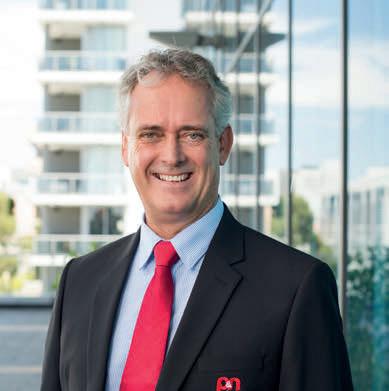



P&N Bank proudly supports WA Police employees Reach your home ownership goals with our dedicated offer for WA Police employees including a $1,500 cashback offer, 100% balance interest offset facility, 100% of overtime taken into consideration and no establishment or monthly fees. We’re here for you: pnbank.com.au/police To find out more contact Jessica or Ross: South Ross Inglis 0413 200 453 ross.inglis@pnbank.com.au North Jessica Nguyen 0428 800 661 jessica.nguyen@pnbank.com.au To decide if the product is right for you and for full terms and conditions (including limitations and exclusions), please read and consider the relevant Product Disclosure Statement (PDS). Any advice given is general only and does not take into account your personal objectives, financial situation or needs. Police and Nurses Limited (P&N Bank) ABN 69 087 651 876 AFSL/Australian Credit Licence 240701. Lending criteria and terms and conditions apply. P&N Bank reserves the right to withdraw the offer at its discretion. Fees and charges are payable. Offer not available when applying for a home loan through a broker. Not available with any other offer. 1,500 cashback $ Purchase or refinance your home with us, and you could get Eligibility criteria apply.











































Former National Basketball League pro Damian Martin knows a slam dunk. That’s why he chose Fleet Network for his novated leasing needs. Damian drives with Fleet Network Join Damian and thousands of clients Australia wide saving thousands on their next car Exclusive discounts on your upfront purchase price Pay $0 in GST Roll your running costs – fuel, insurance, servicing and more! – in your repayment Fixed term rate during your lease Talk to Kane Bowra today to learn more 0401 522 626 kaneb@fleetnetwork.com.au Get a Quote
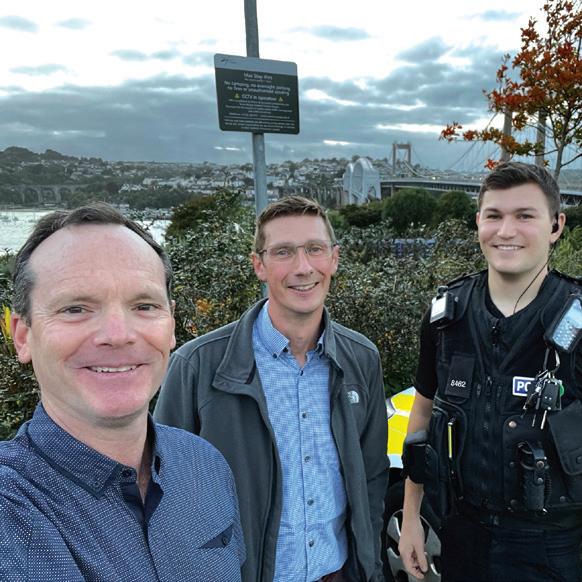

POLICE NEWS MARCH 2023 4 CONTENTS POLICE NEWS THE MAGAZINE FOR THE WA POLICE UNION MAR 2023 06 BOARD OF DIRECTORS & STAFF 08 PRESIDENTS REPORT WA Police Union Acting President Paul Gale’s speech at our Retirement Dinner 28 FIELD REPORT 33 LEGAL 34 HEALTH 35 MOTORING 36 NEW MEMBERS 38 RETIREMENTS & RESIGNATIONS 39 VALE 10 There and back again: what I learnt in the wide world of policing Sergeant Glen Blackwell spent three months overseas riding alongside international police officers. 16 WAPU Annual Retirement Dinner
20 Blue Poppy Study An open letter to police officers from the researchers of the Blue Poppy Study. 22 Meet your PAOs fighting for change Hear what some Police Auxiliary Officers have to say about their Industrial Agreement negotiations. 30 Police officer of the year Meet your police officer of the year –Senior Sergeant Trisha Stjepic.
Photos
from our February Retirement Dinner at Optus Stadium.
WAPOLICE UNION
639 Murray Street, West Perth WA 6005
P (08) 9321 2155 E admin@wapu.org.au
OFFICE HOURS Monday-Friday 7am-4pm
AFTER HOURS EMERGENCY DIRECTOR 0438 080 930 www.wapu.org.au
Follow us facebook.com/WAPoliceUnion
Twitter @WAPoliceUnion
Instagram instagram.com/wapoliceunion
PUBLISHED BY WA Police Union

639 Murray Street, West Perth WA 6005 (08) 9321 2155
ADVERTISING WA Police Union (08) 9321 2155

DISCLAIMER WAPU (“Publisher”) advises that the contents of this publication are the sole discretion of the WA Police Union and the magazine is offered for information purposes only. The publication has been formulated in good faith and the Publisher believes its contents to be accurate, however, the contents do not amount to a recommendation (either expressly or by implication) and should not be relied upon in lieu of specific professional advice. The Publisher disclaims all responsibility for any loss or damage which may be incurred by any reader relying upon the information contained in the publication whether that loss or damage is caused by any fault or negligence on the part of the Publishers, its Directors or employees.
COPYRIGHT All materials in this publication are subject to copyright and written authorisation from WAPU is required prior to reproduction in any form.
ADVERTISING Advertisements in this journal are solicited from organisations and businesses on the understanding that no special considerations other than those normally accepted in respect of commercial dealings, will be given to the advertiser. All advertising is undertaken in good faith and WAPU takes no responsibility for information contained in advertisements.
COVER Police Auxiliary Officer Lisa Little.
ABOVE Sergeant Glen Blackwell spent three months overseas with international policing agencies.
POLICE NEWS MARCH 2023

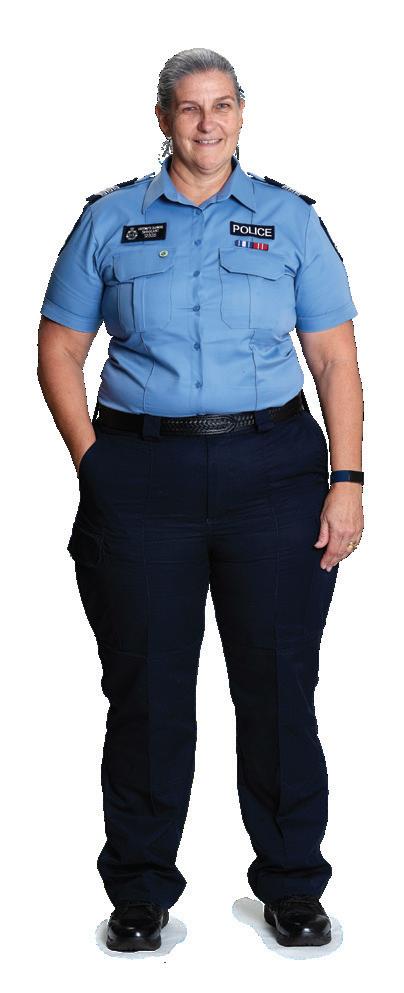








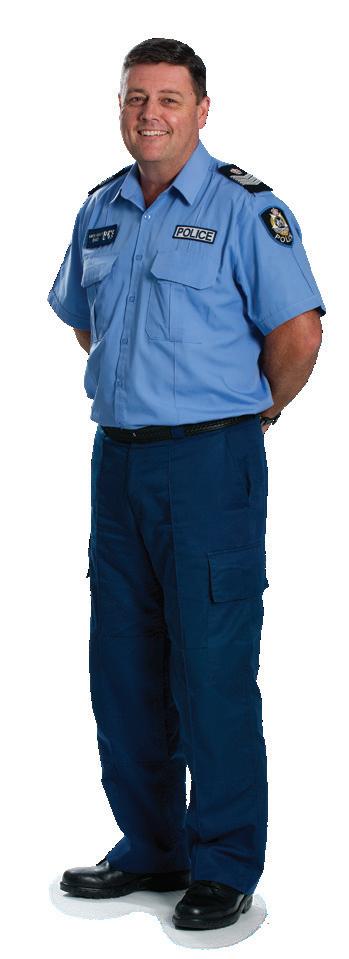
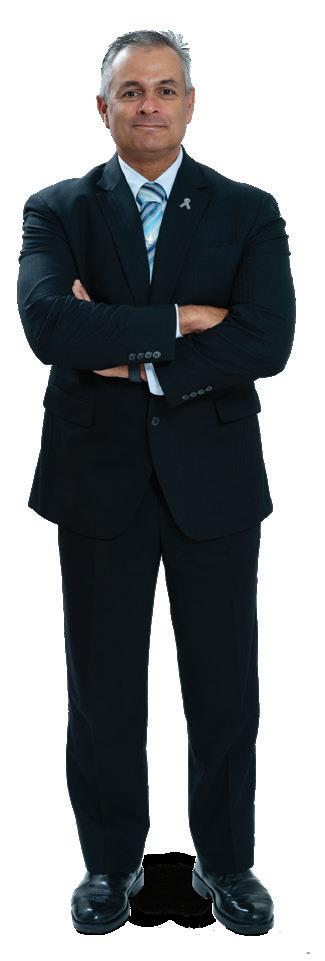



STEPHEN FARRELL Industrial Officer ANNTOINETTE CASHMORE Director 0436 861 370 WARD ADAMSON Director 0457 603 311 LINDSAY GARRATT Director 0407 775 050 NIKOLA KAURIN External Media Communications Manager PAUL HUNT Secretary BRAD BIRD Director 0427 743 889 MARTIN VOYEZ Treasurer 0438 992 374 DAVE FLAHERTY Vice President 0436 856 085
MICK KELLY President 0438 080 936 JESSICA CUTHBERT Media Officer MATTHEW PAYNE Research Officer KEVIN Field
WAPOLICE UNION
CHRIS VITLER Finance Manager CLAUDIA FUENTES BELTRAN Industrial Officer PAUL GALE Senior Vice President 0438 080 930 24/7 EMERGENCY DIRECTOR 6 POLICE NEWS MARCH 2023
Staff Board of Directors
BOARD OF DIRECTORS & STAFF
BRANCH PRESIDENTS
Academy Tiffany McAlinden
Air Wing John Gobbels
Armadale Gosnells Warren Dowbysch
Avon Jason Mora
Bunbury Australind Gareth Reed
Cannington Cindy Beckwith
Central Great Thomas Briscoe
Southern
Central Midlands Michael Paterson
Central West Coast Mick Gill
Commissioned Kim Travers
Officers
East Kimberley Rob Jonas-Green
Eastern Goldfields Fergus MacKinnon
Eastern Wheatbelt Adam Simmons
Financial Crimes Tash Lee
Fortescue Emily Gilbert
Fremantle Kylie Fleming
Gascoyne Chris Fox
Geraldton Pete Gerada
Great Southern Nathan Parkey
Intelligence Contact WAPU
Operations
Joondalup Jon Bailey
Leeuwin Naturaliste Tarryn Stone
Licensing David Taylor
Enforcement
Major Crime Greg Hart
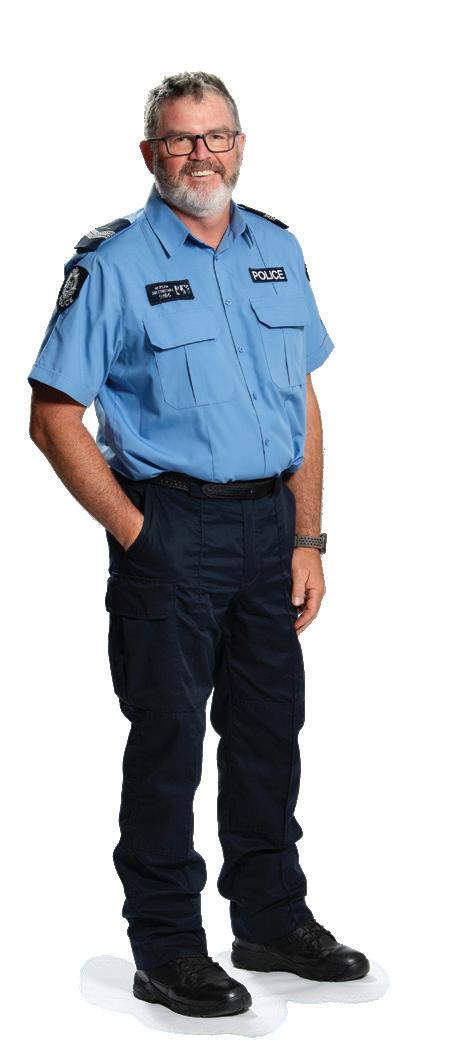
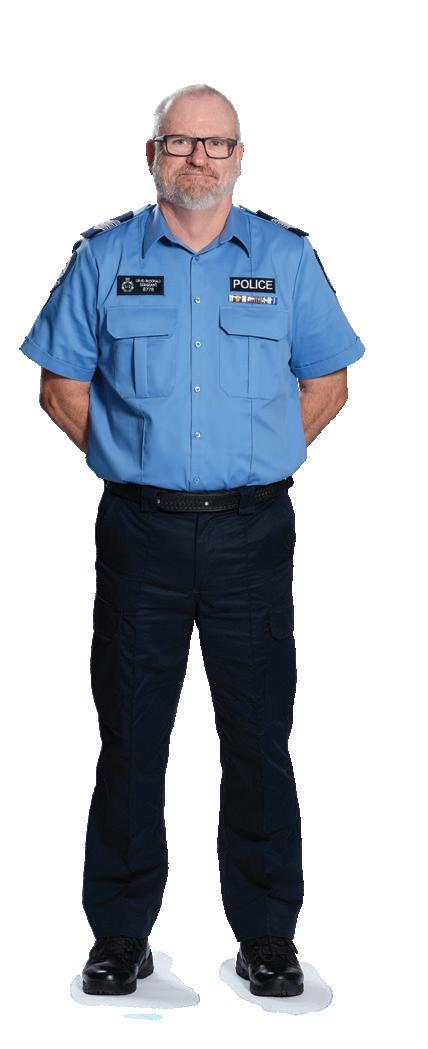
Mandurah Harry Russell
Maylands Complex Todd White
Midland Mike Pearce
Midland Workshops Jeanette Maddison
Mirrabooka David McDonald
Multi Functional Martin Glynn
Police Facility MFPF
Murchison Max Walker
North Eastern Kevin Guy
Goldfields
North Pilbara Glenn Wishart
Northern ROG Andrew Reid (Vice President)
PAO Property Lisa Little
Perth Bec Luetke-Brinkhaus
Perth Watch House Ryan Scott
Professional Stephen Perejmibida



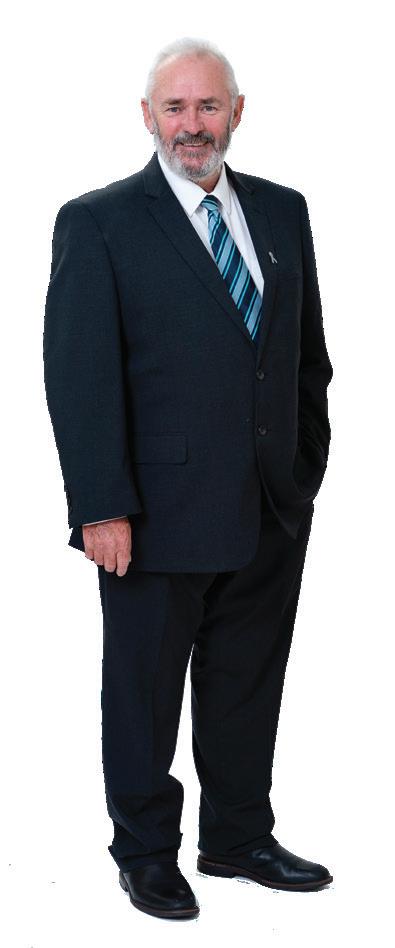



Standards (Vice President)
Prosecuting Sharon Cumbers
Rockingham Kwinana Dayna Rigoir
Serious & Ryan Barnes
Organised Crime (Vice President)
Sex Crimes Paul Smith
South East Eyre Vacant
Southern ROG Steve Kent
State Traffic Matt Hudson
Operations
Traffic Enforcement Lance Munckton
Group North
Traffic Enforcement Shane Wheeler
Group South
Upper Great Cheryl Bell
Southern Water Police Craig Anderson
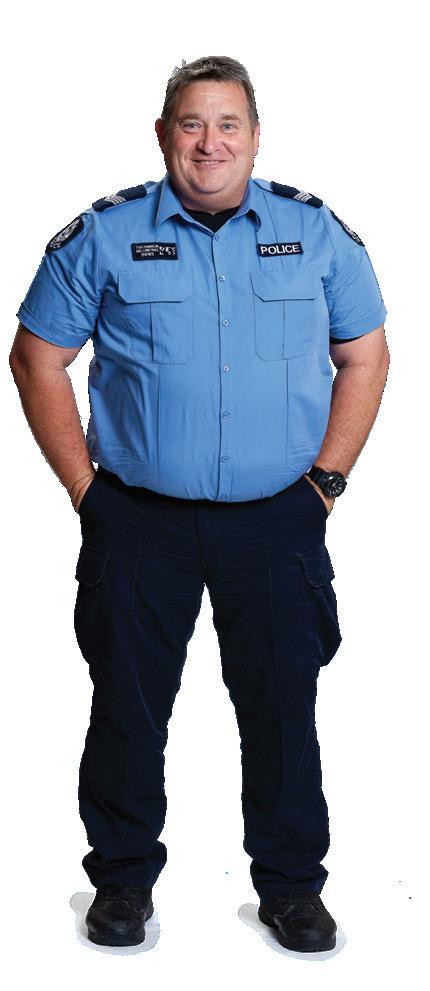

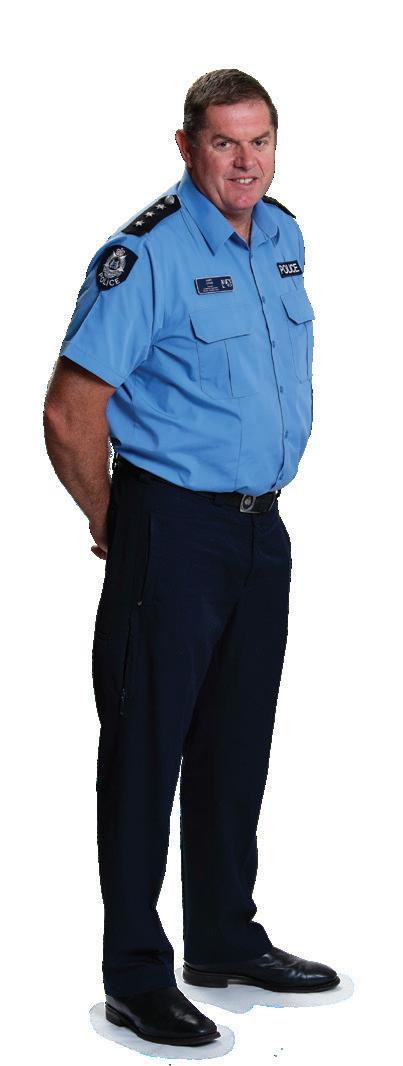
West Kimberley Cameron Outred
Sasa Dzaferovic

GARY LEWIS Director 0434 328 417 NARELLE KIDDEY Director 0403 193 790
Director 0437 829 145
TARRYN SMITH Finance Officer BRAD SINCLAIR Finance Officer GARY KEENAN Field Officer
KEVIN
MCDONALD Field Officer
SCOTT SULLEY
PENNY BROWN Member Services Officer
7 Director 0436 854 611
0439 653 724 TODD
Director 0433 567 519 POLICE NEWS MARCH 2023
West Pilbara
DAVID McDONALD Director
ROBINSON
MARTINA MALEY Administration Officer
PAUL GALE Acting President
Change and Perseverance
Good evening.
My name is Paul Gale, and I’m the Acting President of the WA Police Union. On behalf of the staff and directors of the union, I welcome you to the 2023 Annual Retirement Dinner of the union. The sponsors for this year’s dinner are Fleet Network and Slater and Gordon, and our MC is sports columnist Tim Gossage. Tonight, we will celebrate the career of 63 police officers who recently retired from the Western Australia Police Force. These officers have, among themselves, over 2,000 years of service, and later I will invite them to the stage and present them with a watch as small form of recognition for their service.

I acknowledge the traditional owners and custodians of the land on which we gather, the Whadjuk people of the Noongar nation. Further, I acknowledge the presence of WA Police Acting Commissioner Kylie Whiteley APM.
The title of my speech is, ‘change and perseverance: how you’ve protected the good and improved the flawed’.
In his book, Reflections on the Revolution in France, the British philosopher Edmund Burke said, and I quote, “Society is a partnership between those who are living; those who are dead; and those who are yet to be born”.
Burke believed that it was the solemn responsibility of every generation to preserve what was good of the previous generation, and to improve what was flawed so that the next generation is better prepared to deal with the challenges and opportunities of the future.
I can’t think of any group of people who better personify that type of thinking than police officers. We are charged with perhaps the most important function in society: to protect and serve the community. And in the exercise of doing that, we must constantly ask ourselves, “are we meeting the current and future community safety needs of the people?”.
That is why in my speech tonight, I will share with you several examples of where I believe that you, the retiring class of 2022, have protected the good and improved the flawed and by virtue of that, created a better police force.
INDIGENOUS AFFAIRS
In 1975, Aboriginal Police Aides were introduced in Western Australia. Ours’ is the state with the highest share of indigenous Australians. Yet for a long time, these Australians were almost exclusively the subject of policing, rather than being a part of it. Today, we have the Police Preparation Programme, and I’m immensely proud to be a part of an agency that strives for greater participation in this regard.
That same year, we saw the introduction of the Police Air Wing: which was a much-needed addition to a state as large as ours’, and a reflection of the increasing use of vehicles in crime.
WOMEN’S INTERESTS
In 1976, women were able to receive all the training and carry out all the duties associated with being a police officer. I’ve always said that police officers are of and from the community, and it’s important that we reflect their image and life experiences. It was only a matter of time until we got our first female Superintendent in 1986, Val Doherty: a woman who also became the first-ever female recipient of the Australian Police Medal in 1991.
SOME LABOUR RIGHTS
In 1986, we saw the introduction of the offence of Assault Police Officer. Apart from being a new and specific offence, this was also a recognition that an assault against a police officer is different than an assault against a member of the public. If you assault a police officer, you not only endanger the welfare of that officer, but you also endanger the service that they provide to the community, and by virtue of that, the safety of members of that community.
The following year in 1987, we saw a wave of new recruits join the agency alongside the America’s Cup yacht race which was being held that year in Perth. It would not at all surprise me to learn that some of you can trace back your career to that memorable event.
8
THE FOLLOWING IS A TRANSCRIPT OF THE PRESIDENT’S ADDRESS delivered by WA Police Union Acting President Paul Gale at the 2023 Retirement Dinner of the union
We are charged with perhaps the most important function in society: to protect and serve the community. And in the exercise of doing that, we must constantly ask ourselves, “are we meeting the current and future community safety needs of the people?
MERITOCRACY
In 1994, the agency moved away from issuing promotions based on seniority to instead issuing them based on merit. This was a landmark reform. We, Australians, are an egalitarian people. We elevate those who do well, not just those who come from a well-off background. Having joined the agency during this period, I’m grateful to have had the opportunity for my work to be assessed on both its strengths and weaknesses. I like to think that that experience has made me a better police officer.
SERVICE VS FORCE
That same year, the agency changed its name from the Western Australia Police Force to the Western Australia Police Service. I will go on record and say that, at the time, I was uncomfortable with this change, and I am thankful that in 2017, the agency reverted to its previous and present name of the Western Australia Police Force

Police officers are public servants, but we are not like other public servants. We are authorised by the state to use force to implement the will of the people. Apart from the armed forces, no other group of people has that responsibility. And, rather than downplay that task, I think it’s something of which we should be proud because ultimately it’s reflection to the strength of civil society in Australia that they feel comfortable to provide us with that responsibility without fear that we will endanger their civil liberties.
JOONDALUP POLICE ACADEMY
In 2001, the new Police Academy in Joondalup opened its doors for the first time. I daresay that most of you, like me, would have completed their training at the old Police Academy in Maylands. While I very much have fond memories of that place, I welcome the transition to a larger and more capable premises. This development signalled to the people of Western Australia that the Government intended to take seriously the future community safety needs of the people.
TASERS
In 2007, tasers were rolled out to police officers. I recognise that, at the time, their introduction was controversial. But today, their presence is an accepted fact. Any police officer who joins the agency today would struggle to imagine going to work without one. They are a vital component of any police officer’s tool kit, and I’m proud of the role that the union played in rolling them out.
MORE LABOUR RIGHTS
The period between 2008 and 2022 saw perhaps the greatest improvement to labour rights for police officers in the history of WA Police.
In 2008, we saw the end of single person patrols and good riddance. The recent tragedy in Queensland involving the shooting deaths of constables Rachel McGrow and Matthew Arnold demonstrate the dangers and outright recklessness of sending a police officer alone on a patrol.
That same year, the Police Medical Expenses for Former Officers Act came into effect. And police officers who suffered an injury during their work were guaranteed the lifetime care and support that they deserve.
In 2009, the Government implemented sentencing for assaulting a police officer. This reform sent a strong message to would-be offenders that if you’re thinking about harming a police officer, you’re going to get locked up.
2019, we were issued with Body-Worn Cameras. This was a sign of the times, and a reflection of the fact that the community wanted to know more about our job.
Last year in 2022, the Police Compensation Scheme came into effect. We all know that our job is a tough job. And for some, it may cause us to retire sooner than we expect. For that reason, it’s vitally important that the Government provides support during these unforeseen circumstances.
CONCLUSION
None of the reforms that I’ve highlighted to you in my speech tonight would have been possible without your open-mindedness and skills of critical thinking.
From the bottom of my heart, I thank you for your service to the state of Western Australia. I would also like to pay my respects to my friend and mentor James “Jim” Migro who last year retired after a whopping 53 years of service to the agency.
To Jim, and to every single police officer present in the room who has recently retired, I thank you for your service, and I wish you a very happy retirement. Cheers!
9
PRESIDENT’S REPORT
THERE AND BACK AGAIN: what I learnt in the wide world of policing

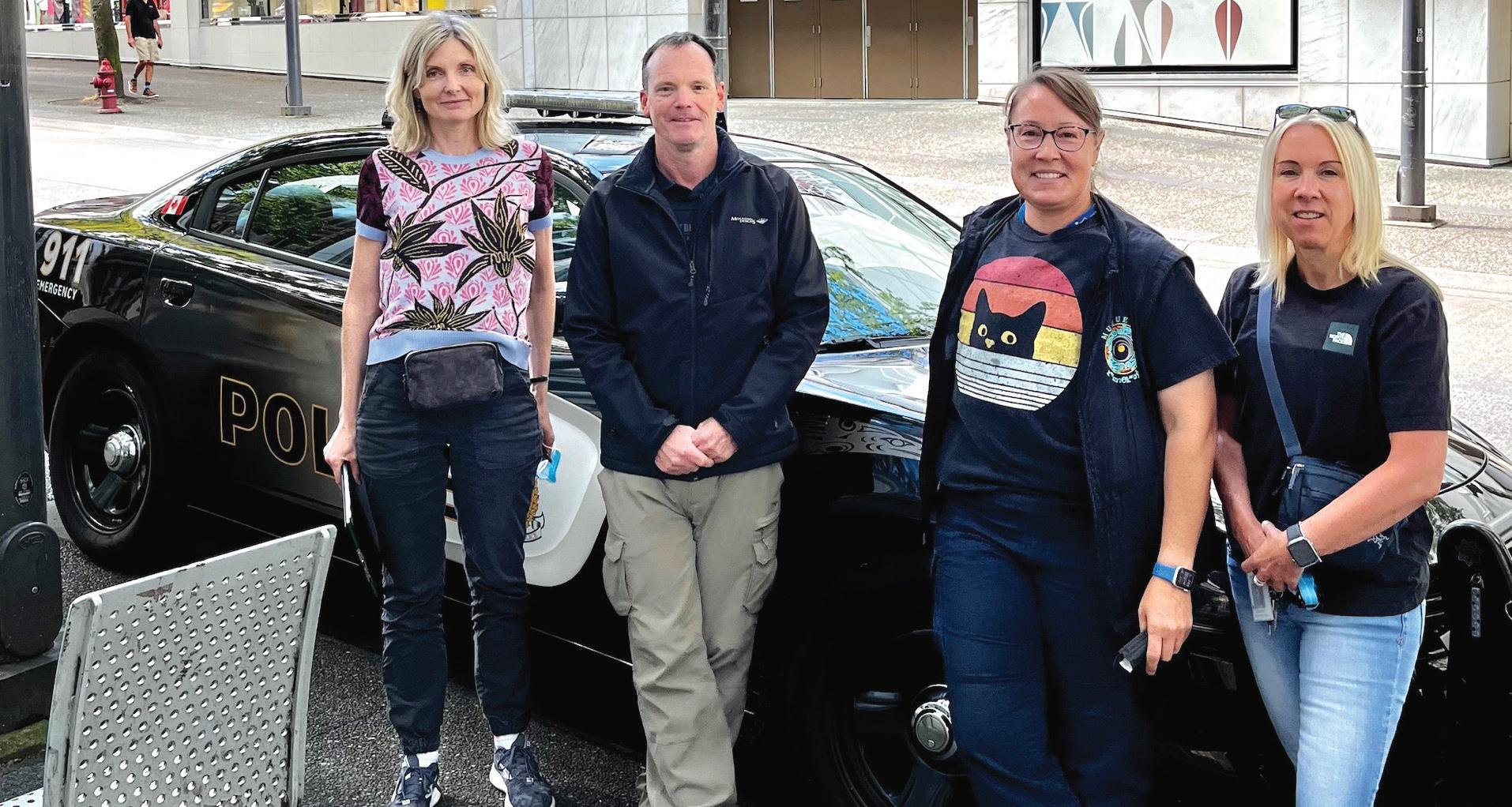
POLICE NEWS MARCH 2023
Sergeant Glen Blackwell joined the Global Law Enforcement and Public Health Association to gain insight into how other agencies in the world are implementing strategies and programs to better interact with people suffering from behavioural health crisis.
He joined the association after taking up a position at the WA Police Force Mental Health Co Response Unit and realised the best way to investigate these strategies would be to see it on the ground in action. This led him to successfully applying for and being granted a Winston Churchill Trust Fellowship.

After spending three months overseas working alongside several police and government agencies, Sergeant Glen Blackwell has published a report of his recommendations and strategies to implement so police officers are better equipped with responding to behavioural health crisis.
“Police have these high utilisers who are consistently engaging emergency services, so we think to ourselves ok how do we as police traditionally deal with recidivism? I was looking at how we break the cycle, but what I learnt from going away is that it’s very much a bigger picture than that. This is a societal issue which needs a societal answer,” he said.
Canada
First on the itinerary was a stop in Vancouver where Glen spent one week engaging with the Vancouver Police and Vancouver Coastal Health Departments.

“Vancouver was one of the first in the world to introduce a policing Co-Response model in 1978, similar to the one we have now in WA that was rolled out in a trial in 2016,” he said.
“They then expanded to having an Assertive Outreach Team (AOT) and Assertive Community Treatment Team which are proactive models identifying their high utilisers.”
Glen said both teams operate with a multi-agency approach between police and health.
AOT is designed to focus on the top 25-30 High Utilisers who are high risk of harm and treatment resistant in an intensive approach to stabilise over a period of up to 3 months. Most of the consumers in this group have been through the judicial system for serious offences and their mental capacity has played a part in their offending.

POLICE NEWS MARCH 2023 11
USA Eugene Oregon Los Angeles Pittsburgh Houston ENGLAND Liverpool –Merseyside Exeter –Devon & Cornwall
▷
“Police have these high utilisers who are consistently engaging emergency services… I was looking at how we break the cycle, but what I learnt from going away is that it’s very much a bigger picture than that. This is a societal issue which needs a societal answer,”
ITINERARY CANADA Vancouver 01 02 04 03
01 Vancouver Mental Health Team attending a task (Police & Health staff). 02 Hastings Street, Vancouver homelessness photographed while attending to a task in this cohort. 03 On patrol with Vancouver Assertive Community Treatment Team (ACTT). 04 Glen in Los Angeles.
America
CAHOOTS, EUGENE OREGON
In Eugene, Oregon, Glen worked alongside Whitebird Clinic staff in their CAHOOTS program - Crisis Assistance Helping Out On The Streets which was founded in 1989 by the city of Eugene and is funded out of the Eugene Police Department & public safety budget.
The program assembles two-person teams consisting of a medic (a nurse, paramedic, or EMT) and a crisis worker who has substantial training and experience in the mental health field.
“Their data shows that the program is beneficial. They are sending out a vehicle with a licensed clinical social worker and emergency medical staff - no police presence in the vehicle – and are dispatched by their call centres who identify the risk assessment,” Glen told Police News
“They have police radios with them and can acquire backup at any time if the job escalates. I went out on several jobs with the team where in every case no police were needed, and the situation was resolved in the home or with transport to a facility care centre.”
“All those jobs add up, so that’s people that aren’t seeing a police officer or people that aren’t going into the judicial system. It’s a great diversion system freeing up police resources.”
A November 2016 study published in the American Journal of Preventative Medicine estimated that 20 percent to 50 percent of fatal encounters with law enforcement involved an individual with a mental illness.
LOS ANGELES, CALIFORNIA
Glen’s next stop was Los Angeles to ride alongside the Los Angeles Police Department’s Mental Evaluation Unit.
“This was an incredible experience. They have had a mental health division for around 40 years and also run a Co-Response model. They have a triage centre, detectives investigations team and a proactive case management team who I also spent a day with tasking out and seeing how they engage their High Utilisers,” he said.
In his second week in LA, Glen participated as a student on their 40-hour mental health training – a program called Mental Health Intervention Team (MHIT) which was undertaken at the LAPD Academy.



“The Western Australia Police Force have no training available to officers in this scope and certainly none that is mandatory. This is one of my recommendations out of my studies and something I would love to see implemented more in the field and in our police academy,” he said.
A standout policy Glen observed in LA was their disengagement policy.
“If officers get to a job and the person is only posing a risk to themselves and no one is there, it could be assessed to potentially allow for disengagement. If someone is barricading in and it looks like it could even escalate to a suicide by cop, or if police think their engagement will make it worse or if they can confirm there is no risk to others, they will make the call to disengage and possibly go back or have a mental health clinician respond.”
“WAPOL don’t have a disengagement policy and officers are required to stay on the scene. If someone is threatening harm – we will more than likely have to force a door and force an encounter of some sort which does not always have a positive result, we need to be prepared to absorb some risk as an agency around these types of calls” he said.
“WAPOL don’t have a disengagement policy…
05 06 07
If someone is threatening harm – we will more than likely have to … force an encounter of some sort which does not always have a positive result…”
“I was lucky enough to be at an active job in LA– where they engaged this policy. The person was very paranoid and known to mental health services. On site we had SWAT teams and lots of police presence. He disengaged with the mental health practitioner and the negotiator, so it was clear that talking was not going to work,” he said.
“In traditional policing mode, officers would force some sort of conduct which more than likely would have ended in force and maybe fatal force. He was the perfect candidate for this policy as he was only threatening himself. Hours later officers were able to go back to him and engage with him when he had come out of that heightened crisis.”
PITTSBURGH, CRISIS INTERVENTION TEAM INTERNATIONAL – NATIONAL CONFERENCE
Whilst in America, Glen attended a Crisis Intervention Team Conference in Pittsburgh – a forum that brings together crisis teams from all around America looking into how everyone’s crisis intervention programs work.

Glen said he heard from several jurisdictions who had developed behavioural health receival units, designed so police officers aren’t having to transport people to emergency departments in hospitals, instead they are 24/7 mental health centres. Behavioural health receival centres is the new push forward in the USA.

“So as an example, in WA if an officer has apprehended someone under the mental health act, instead of taking them to Charlie Gardiner ED – off to the side of that there would be another ward which is purely designed for behavioural health crisis patients, and they would take them there. This in turn frees up emergency rooms and police resources who aren’t waiting around at a hospital for hours,” he said.
“The flow-on effect would be huge. Police aren’t stuck at emergency departments for hours, St John ambulance isn’t ramped. Overseas, these centres have a half hour turnaround time.
“In WA we still really only have one option if we think a person is in a mental health crisis and needs some sort of behavioural health crisis management and that is to apprehend under the mental health act and convey them to hospital for an assessment. This extends wait times and is quite often not necessarily the best outcome for the person involved,” he said.
“There is a lot of research showing that emergency departments heighten the crisis the person is experiencing –the activity, the noise and even the police presence. It could be established earlier that police presence is not needed.”
Glen said a prominent theme across several agencies was around diversion which even extended to diversion from the onset with call diversion.
“I was there in September and in July they were launching the national 988 number. They did run on a system of a 10 digit number for behavioural health crisis, like the one we have now. But they identified that if you aren’t in the right state of mind, you’re not going to remember a long number for your mental health crisis so created a secondary triple number.”
“One of my recommendations from my research is that we could have something similar to ensure the calls that come through are getting the appropriate responder not always a police officer responding to a job that a clinician could attend,” he said.
“We all know that police respond to a vast majority of 000 calls – but often police aren’t necessarily required. Yet if the public are in crisis and trying to remember complex numbers, inevitably a simply 3 digit number like 000 is the fall back effect.”
United Kingdom
LIVERPOOL AND EXETER
Concluding his trip, Glen spent 10 days with Merseyside Police, and a week with the Devon and Cornwall Police.

Glen’s highlight was being able to spend time with the team at First Response which is the National Health Services diversion system for behavioural health crisis and similar to the USA’s 988 alternate call number operates from the 111 alternate 3 digit number to 999.

“They have really great proactive programs in this space as well,” he said.
“They have a fantastic first response program working out of their triple 1 call centre where they send out a non-police response. Their triage systems work well. 111 calls only result in a need to call on police 2 percent of the time which shows again there is capacity to divert some of these types of calls away from police.” ▷
POLICE NEWS MARCH 2023 13
09 08 10 11
05 A visit to the LA Police Academy. 06 Chief Blocker Chief of Police Houston Police. 07 LAPD attendance to active Behavioural Health Crisis task. 08 Glen completing his CIT Coordinator Certification Course. 09 Glen riding with the CAHOOTS program. 10 A visit to the Devon and Cornwall Police Headquarters. 11 Merseyside Police Mental Health officers.
The report
After his travels, Glen was tasked with writing his report to submit it to the Churchill Foundation, outlining his findings, experiences and recommendations to bring back to Australian policing.
His recommendations came down to the four stages of diversion as outlined on the right.
Since returning home he has undertaken many late night/ early morning virtual meetings and conferences which his connections not just from these visited agencies but by the shared connections in this field the Winston Churchill Trust Fellowship has allowed him to access.
Glen has sent his report to Churchill for their consideration to publish his findings and recommendations which will be published to the Churchill Trusts website for open access.
“I’m then expected to go out and discuss my report with agencies across the country and make moves to try and get some of my recommendations implemented,” he said.
“I’ve already had some meetings with some inspectors in WA and officers from other jurisdictions have already reached out to find out more.”
Glen said he has already been asked to go back to America and be a guest presenter at a National Co Response Conference to represent and discuss his Churchill Fellowship findings and report
“I went away with a very narrow police scope thinking that these issues were for police to investigate. I soon realised it was a much wider issue, where other and more agencies need to get involved,” he said.
“It’s not going to be just a policing issue, we need a national approach. For example introducing a secondary triple digit number for mental health crisis and establishing a 24/7 mental health crisis call centre and receival unit.”
“All these recommendations and strategies is a completely systems based approach and not one of these things will work by implementing just one, each one of these things is dependent on the other being successful like spokes in a wheel.”
Glen said the WA Police Force mental health Co-response Unit was still formulating training but if any officer wants advice or guidance in this scope they can call him anytime.
“I’d love to look into a more proactive scope, implement field trips, talk to the troops on the ground and have more in-depth and appropriately resourced training and courses available.”
Glen said there was a stark difference between how things are done overseas and in WA.
“There’s a lot of room for us to expand into areas where other agencies have already moved in to. Since 50 years ago we have taken a step on the road and now we can keep walking along that road and expanding to where we have seen others lead the way.” ■
THE FOUR STAGES OF DIVERSION CALL DIVERSION
• Divert the emergency calls away to the relevant agency/responder so they don’t reach emergency services if not necessary. Clinicians can respond initially and not first responders.
• Create a separate triple digit number – mental health.
• Have positions created at POC where a clinician or qualified health professional is trained in the area to evaluate calls that is more a mental health job, therefore not sending police resources.
RESPONSE DIVERSION
• Have a similar set up to the CAHOOTS. A fulltime 24/7 service, sending non police responders.
OUTCOME DIVERSION
• Have face to face training courses readily available for officers to better understand behavioural health crisis and how to manage it.
• Have a dedicated Behavioural Health Crisis staff from both police and health working together in a full-time role. World practice shows BHC management is treated as standard police/health business and resourced accordingly.
• Look into the feasibility of disengagement policies.
• Construct fit for purpose crisis receival centres in turn freeing up policing and health resources.
• Jail diversion programs. Whilst at a scene, if a very minor offence occurs and the offender is clearly mentally unwell. Not unwell enough to go to hospital or a crisis centre and doesn’t need to be arrested – have the options of a jail diversion. Set them up into programs and rehabilitation short stay centres with no record against their name.
HIGH UTILISER DIVERSION
• Identify the high utilisers in the community and target how to get them off the books.
• Implement programs and proactive engagement.
• Implement more training and back capture officers then embed in our recruit training at the police academy.
• A gun is a threat – but mental health is also a threat –officers need to be able to tackle both these issues.
• An improved data collection system around mental and behavioural health. Data is key to understanding where demand pressures and trends are allowing for proactive resourcing by all stakeholders.
• More frequent multi agency meetings and forums at a high level.
POLICE NEWS MARCH 2023 14
“I went away with a very narrow police scope thinking that these issues were for police to investigate. I soon realised it was a much wider issue, where other and more agencies need to get involved.”

POLICE NEWS MARCH 2023 15 Slater and Gordon have been proudly looking after the rights of Unions and their members for over 85 years. We work hard to help achieve the best possible outcomes for our clients, while reducing the stress that they go through during the process of their claim. We can help by reviewing your current road claim* to help you ensure that you receive all your potential entitlements. With our No Win, No Fee* offer you can afford access to the justice you deserve. For a referral to Slater and Gordon or to learn more about our exclusive Union member benefits, contact the WA Police Union Office on (08) 9321 2155. *This is applicable only to the review of an existing claim. **NWNF T&C’s: slatergordon.com.au/NWNF If your claim is unsuccessful you won’t need to pay Slater and Gordon’s fees, however, you may still be liable to pay third party costs and disbursements.




















8 FEBRUARY 2023 OPTUS STADIUM
BY FLEET NETWORK AND SLATER & GORDON LAWYERS
2023 WAPU Annual Retirement Dinner WEDNESDAY
SPONSORED
















POLICE NEWS MARCH 2023 17 WAPU RETIREMENT DINNER 2023
POLICE NEWS MARCH 2023 18 Superintendent James MIGRO 4598 • 50 years ■ Senior Sergeant Carl FISHER 4870 • 48 years ■ Senior Constable David HERRINGTON 5141 • 39 years ■ Inspector Paul NEWMAN 5172 • 44 years ■ Sergeant Robert BELLIS 5611 • 45 years ■ Commander Michael SUTHERLAND 5662 • 45 years ■ Sergeant Phillip BASKERVILLE 5665 • 44 years ■ Commissioner Christopher DAWSON 5715 • 41 years ■ Sergeant Graeme BOND 5768 • 44 years ■ Inspector Steven BRADLEY 5856 • 43 years ■ Inspector Wayne SILVER 5994 • 43 years ■ Senior Constable Steven BAKER 6025 • 42 years ■ Senior Constable Brett RODDA 6092 • 43 years ■ Senior Constable Mark CUNNINGHAM 6117 • 42 years ■ Senior Constable George LEWIS 6142 • 42 years ■ Inspector George McINTOSH 6189 • 42 years ■ Senior Constable David McNAUGHT 6244 • 41 years ■ Senior Sergeant Douglas WIGNALL 6245 • 41 years ■ Sergeant Phillip HEATHCOTE 6256 • 41 years ■ Sergeant Gregory HAY 6257 • 41 years ■ Senior Sergeant Patrick BLEE 6258 • 41 years ■ Sergeant Marcel WALSH 6261 • 41 years ■ Sergeant Michael O’MALLEY 6267 • 41 years ■ Sergeant Gavin MANNERS 6271 • 41 years ■ Sergeant Michael HOLMES 6272 • 41 years ■ Senior Constable Theron KINGHORN 6285 • 40 years ■ Senior Sergeant Peter SAWYER 6293 • 40 years ■ Sergeant Gary SEARLE 6297 • 41 years ■ Sergeant David BYRNE 6304 • 40 years ■ Senior Sergeant John WAGHORN 6326 • 41 years ■ Sergeant Peter SHELLAM 6330 • 40 years ■ Senior Sergeant Christopher RUCK 6335 • 41 years ■ Senior Sergeant Rodney HAWKINS 6367 • 40 years ■ Senior Constable James CAMPBELL 6369 • 41 years ■ Senior Sergeant Mark REGEL 6450 • 40 years ■ Superintendent Martin COPE 6471 • 40 years ■ Sergeant Peter JANCZYK 6473 • 40 years ■ Sergeant David MALLOWS 6479 • 40 years ■ Inspector Jack LEE 6484 • 40 years ■ Sergeant Gavin THOBAVEN 6489 • 41 years ■ Senior Constable Robert WRIGHT 6493 • 39 years ■ Senior Sergeant Peter McLEAN 6514 • 40 years ■ Senior Constable Steven PAVLOVICH 6554 • 39 years ■ Sergeant Paul BROWN 6584 • 40 years ■ Sergeant John DAVISON 6604 • 40 years ■ Sergeant Lloyd ELLIS 6637 • 39 years ■ Inspector David HOOPER 6649 • 38 years ■ Sergeant Russell CHAMBERLAIN 6670 • 38 years ■ Senior Constable Alexander FERRIER 6696 • 39 years ■ Senior Constable Edward LAMPERD 6741 • 38 years ■ Sergeant Steven DROWN 6818 • 38 years ■ Senior Constable George MIOCEVICH 6833 • 38 years ■ Senior Constable Simon HILL 6834 • 37 years ■ Deputy Commissioner Gary DREIBERGS 6865 • 37 years ■ Sergeant David SAYER 6871 • 37 years ■ Thank you for your membership and service Congratulations to our 2022 Retired Members
WAPU RETIREMENT DINNER 2023
POLICE NEWS MARCH 2023 19 Sergeant Geoffrey TILLEY 6893 • 37 years ■ Sergeant Craig REYNOLDS 6923 • 37 years ■ Senior Constable Michael VAN BOHEEMEN 6990 • 36 years ■ Commander Susan YOUNG 6995 • 36 years ■ Senior Constable Graham FINLAYSON 7014 • 37 years ■ Senior Sergeant Scott ARNOLD 7031 • 37 years ■ Sergeant Stephen MARKS 7042 • 36 years ■ Senior Sergeant Trevor TROY 7064 • 37 years ■ Senior Sergeant Steven MARTYN 7115 • 36 years ■ Sergeant Michael JONES 7129 • 37 years ■ Senior Constable James McKEE 7139 • 36 years ■ Sergeant Daniel TALBOT 7248 • 36 years ■ Senior Constable Christopher THOMASON 7317 • 36 years ■ Senior Constable Michael COOPER 7410 • 36 years ■ Sergeant Kimberley LIMBRICK 7477 • 36 years ■ Senior Sergeant Gregory GLOSSOP 7481 • 36 years ■ Senior Constable Darren GRIGSON 7486 • 35 years ■ Senior Constable Jeffrey BUSCUMB 7719 • 34 years ■ Sergeant Andrew SMITH 7721 • 34 years ■ Senior Constable Michelle BEAMAN 7809 • 33 years ■ Senior Constable Eric McANDREW 7829 • 34 years ■ Senior Sergeant David ELLERY 8098 • 34 years ■ Sergeant David TODD 8107 • 33 years ■ Sergeant Debbie CAMPBELL 8256 • 33 years ■ Senior Constable Adrian CALLAGHAN 8282 • 32 years ■ Senior Constable Lance POLLARD 8336 • 33 years ■ Senior Constable Robert LOCK 8533 • 32 years ■ Sergeant Grant DUNSTAN 8599 • 32 years ■ Senior Constable Kevin GOSSAGE 8611 • 32 years ■ Sergeant Russell DRAGE 8656 • 32 years ■ Senior Sergeant Andrew STEVENS 8741 • 30 years ■ Senior Constable Christopher BROWNE 8847 • 30 years ■ Senior Sergeant Alexander WELLS 8854 • 31 years ■ Senior Constable David SODEN 8900 • 30 years ■ Senior Constable John TUFFNELL 8993 • 29 years ■ Senior Constable Robert SHEARN 9024 • 29 years ■ Senior Constable Kevan DELANEY 9154 • 28 years ■ Senior Constable Richard McCLYMONT 9202 • 28 years ■ Sergeant Graham CRANE 9365 • 27 years ■ Senior Constable Neil DAVIES 9393 • 27 years ■ Sergeant Anthony WALTON 9425 • 27 years ■ Sergeant Paul WORLD 9581 • 26 years ■ Senior Constable Mark RYAN 9589 • 26 years ■ Sergeant Richard WELLS 9946 • 25 years ■ Sergeant Trazelle WILKINSON 10021 • 26 years ■ Senior Constable David EGAN 10230 • 25 years ■ Senior Constable Gary DONALDSON 10233 • 25 years ■ Sergeant David JOHNSON 10310 • 24 years ■ Senior Sergeant Ceri SKAMP 10311 • 24 years ■ Senior Constable Paul BURNS 10402 • 24 years ■ Sergeant Alan LAWRENCE 11087 • 21 years ■ Senior Constable Liane HORNE 11105 • 20 years ■ Senior Constable Lisa BARWICK 11122 • 20 years ■ Sergeant Thomas MERCHANT 11198 • 20 years ■ 1/C Constable Christine BEARD 11258 • 19 years ■ Senior Constable Tracy HALL 11761 • 23 years ■ Senior Constable Wade SALTER 11876 • 17 years ■ Senior Constable Diana BALCH 11972 • 17 years ■ Senior Constable Sally HALLIDAY 12059 • 16 years ■ Senior Constable Ernest CAPEWELL 12440 • 27 years ■ Sergeant Bon LIM 12522 • 15 years ■ Senior Constable Beverley HALL 12580 • 15 years ■ Senior Constable Peter GUY 12624 • 15 years ■ Senior Constable Krystyan BARRETT 12677 • 15 years ■ Senior Constable Elizabeth COULTHARD 13151 • 14 years ■ Senior Constable Rory ANTON 13244 • 14 years ■ Senior Constable Nicola DEMPSEY 13315 • 14 years ■ 1/C Constable Shane PARKER 13980 • 12 years ■ Senior Constable Karen SMITH 13984 • 12 years ■ Senior Constable Matthew SCHMECHTIG 14442 • 11 years ■ 1/C Constable Calum COOPER 14947 • 9 years ■ Senior Constable Adam HAINES-MONAGHAN 15198 • 9 years ■ Senior Constable Peter SMITH 15679 • 7 years ■ Police Auxiliary Garry O’NEIL 50927 • 6 years ■ Police Auxiliary Sandra MADELEY 99469 • 10 years ■ Police Auxiliary Louise ATKINSON 99508 • 10 years ■
Help us help an open letter the researchers



“Police work is ridiculously hard to do well, requiring a combination of personal risk, discretion, sensitivity and subtle nuance that is unmatched in any other job.”
(Michael Bradley, 2020)
POLICE NEWS MARCH 2023 20
help you: letter to police officers from researchers of the Blue Poppy Study
Every police officer reading this can relate to that quote. Policing is hard work, and you should quite rightly expect to be supported in your day-to-day activities. Only a small portion of Western Australians go to work each day facing the risk of personal injury, whilst maintaining qualities of sensitivity and understanding.
Police officers are now suffering increased distress associated with; high workloads; procedural red tape; shifting goals and priorities; investigative deadlines; court deadlines. But police officers are resilient and will usually cope by setting new coping mechanisms. The problem with coping is, in the process of adapting to higher and higher levels of pressure, eventually stress will give way to distress and coping is overcome by maladaptive behaviours, such as anxiety, depression, addictions and violence.
The problem with Post Traumatic Stress Disorder (PTSD) and workplace distress is that neither us, as researchers, nor the police force can predict when your adaptive capacities will break and you will become injured. We need to learn more and to do that, we need you to assist us in our research as we delve into the injury, stigma associated with PTSD.
Historically, police officers have been suspicious of researchers and academics who they view as being elite and out of touch with contemporary policing. Conversely, researchers have claimed that officers are defensive and unwilling to learn from external sources. Aside from the police officers themselves, organisations are also suspicious of examination from external sources.
As far back as 1986 it was recognised in the UK that communications between academics and police did not take place. The idiom ‘dialogue of the deaf’ was created to describe the impasse between the two tribes. This is not intended as a slight on the hearing impaired, rather, as a metaphor for an organisational culture that refuses to hear. We need to undo the dialogue of the deaf and to do that we want to hear from you, the men and women of WA Police. For that we need data, in legal vernacular: evidence.
THE BLUE POPPY ANONYMOUS SURVEY

Another of the ridiculously hard tasks of policing is the gathering of evidence. Police officers must sift through hearsay, rumour and gossip to get to the facts, particularly for facts that can be produced as evidence in court. Similarly, the science of health and medicine must also seek fact from fiction. We all know someone who is currently suffering PTSD but currently this knowledge is anecdotal. Anecdote is subjective, it is the hearsay of science. Anecdotal evidence is based on observation and experience, and will point us toward a problem but it cannot be independently verified or proven. Science, on the other hand is objective and must stand up to intellectual rigor.
Originally, this research was going to be carried out by me whilst I was still with WA Police and, for a while, it looked like being successful. Conducting research into policing can be problematic as there can be significant organisational and cultural barriers to overcome. As it turned out, I was unable to overcome the organisational barriers and the research was brought to a halt. That’s where your Union stepped in. The Blue Poppy Study, introduced in the December edition of Police News , is a joint partnership between the WA PTSD Research Foundation and the WA Police Union. We are attempting to establish the prevalence of PTSD in the WA Police because, at the present time, there is no hard data of PTSD in WA Police. Involving the members of the WA Police Union in the research process will ultimately move policing forward. We will do that by conducting a quantitative study and for that we need numbers. High numbers in research equates to better quality evidence and makes our argument for improvement stronger. We will obtain our evidence through an anonymous survey instrument that we trust will provide an important and necessary lens into PTSD within the WA Police. We urge you to participate.
Dan Talbot Lead Researcher, Blue Poppy Study
The foundation anticipates the survey being rolled out within the next 2-3 months and the WA Police Union will keep members posted with any updates. If members have any questions, they are welcome to contact WAPU.
POLICE NEWS MARCH 2023 21
FIGHTING FOR CHANGE
Lisa Little
HOMICIDE SQUAD
1. How long have you been with WA Police and tell us about your current role?
I have been with WA Police for 15 years. First as a Level 2 public servant, 11 years as a Police Auxiliary Officer (PAO). I have been in my current position at Homicide Squad for the past 6 and a half years.

2. Our PAO members often express their frustrations that they are undervalued and overworked. Our log of claim items includes more consultation with WA Police Force, better representation of our PAO members and mechanisms to address workload issues. Why do you feel this is important?
It’s no secret that when the PAO role was created, the worst conditions of the Police Agreement and the worst conditions of the Public Service Agreement were combined into what is now the PAO industrial agreement. A lot of frustration stems from a lack of awareness from The Executive about what we contribute to WA Police. A previous Commissioner stated that he was unaware of how many PAOs were employed by WA Police, and he was unsure of all the roles that were filled by PAOs. Our log of claims has taken into account many of the member issues that are affecting PAOs on a daily basis. I feel we now have a free flowing and open dialogue between our members, The WA Police Union and the WA Police Force. I feel we are beginning to have a strong voice to be able to keep WA Police accountable for their decisions that affect our members.
3. If you could speak directly to our Premier, Mark McGowan what would you like him to understand about the role that you do?
We sat down with some of our PAO members in Perth to hear what they are fighting for and why. Here’s what they had to say.
I would like the Premier to know that when we are out in public, we are often asked “What is an Auxiliary Officer?” I usually explain that we are Frontline support. We enable Frontline Officers and Detectives to go back on the road quicker by completing the necessary administrative tasks that can be monotonous and time consuming. This usually garners a positive reaction from members of the public, as it creates a perception that police are on the road protecting the community, rather than sitting in an office performing administrative tasks. I would also like him to understand that the PAO cohort is an under-rated and under-used resource within WA Police. In the future I would like to see at least one PAO at every Station, Detectives’ Office and Squad providing Frontline Support to our often overworked and undervalued Police Officers.
POLICE NEWS MARCH 2023 22
Our Union is currently in negotiations to replace the Police Auxiliary Officer Industrial Agreement – which expired in November 2022.
The full log of claims – which can be found on the WAPU website – calls for better wages and conditions.
Tash Lee
FINANCIAL CRIMES SQUAD
1. How long have you been with WA Police and tell us about your current role?
I became a PAO in February 2014, so this year will make it 9 years in the job. I am the Property and Exhibits officer for Financial Crimes Squad. I look after items of evidence seized at crime scenes and ensure these are packaged correctly, stored securely, conveyed for analysis, presented at court and disposed correctly when no longer required. I perform data extraction of mobile devices and assist with electronic evidence recording of large quantities of cash. I perform any and all ad hoc tasks that the officers are unable to attend to due to being engaged elsewhere. I also will accompany a sworn officer for low risk tasks when another sworn officer is unavailable. I do quite a bit of organising, sorting various issues out and finding answers to assorted questions the sworn officers may have (such as researching jewellery hallmarks, creating and searchable spreadsheets of each cheque book entry over a 10 year period, identifying and collating location data from mobile phone photos, etc).
2. Why are you fighting for more opportunity for career progression?
After 5 years, the pay increments stop – meaning I will be at the same pay scale for the rest of my time with WAPF.
There is no reward or incentive to work towards. Some days this makes me feel demoralised and my work is not valued. I could be the most outstanding auxiliary but my remuneration is the same as the person who turns up and does the bare minimum.
Other government staff have opportunities for secondments and promotions. This is not the case with auxiliaries. There is no chance to upskill, act in higher duties or perform other roles. It seems that auxiliaries have been forgotten about.
Due to the way the auxiliary banding is structured I am precluded from progressing my rank or applying for any other position that is not ‘like-for-like’. As a Band 1 I am unable to apply for a Band 2 position. Recently a position with Cyber Crime called for EOIs. I had a competitive application and would have been suitable for the position –but was ineligible for consideration as it was advertised as a Band 2. PODU specifically prevents a Band 1 from applying for Band 2 position. This could prevent the best person for the job from applying. I felt this was vastly unfair. The system for auxiliaries is inequitable.
Being in one position for too long comes with all sorts of issues – such as stagnation, mental and physical health problems, feelings of unfulfillment, demotivation and burnout. The auxiliaries at the Watch House face the same gruelling issues shift after shift with no respite. When they are injured or need a break from the environment there is no other position for them to work. Most leave. The auxiliaries at Coronial Investigation, Homicide, Forensic and Sex Crime squads are exposed to all sorts of onerous and distressing duties. There is no variety in the work to do and no opportunity to do anything different. Providing auxiliaries alternate deployment positions will help to sustain the workforce and retain the knowledge base.
3. If you could speak directly to our Premier, Mark McGowan what would you like him to understand about the role that you do?
I have stayed with WAPF for 9 years because I enjoy being able to contribute to my community. I want to make a difference and try to leave the world a slightly better place. I do not wish to be a sworn officer and my skill set is a perfect fit for support roles – which is why I chose to become an auxiliary. I didn’t choose WAPF for the pay and conditions. I wanted to be able to look back on my life and say that I actively tried to assist my community in the best way I could with what skills I had.
Policing is more than boots-on-the-ground. The front line requires support, which is where auxiliaries come in. Auxiliaries stand ready and are prepared to lift the load to help the sworn police officers. We are an underutilised but vital resource that can and should be expanded.
The benefits to our community and the ways we could assist WAPF in being more efficient are endless. Turning the auxiliary officer role into a career choice with a career pathway will retain and support employees. Auxiliaries are an excellent way to expand the Thin Blue Line and support our community. ▷
POLICE NEWS MARCH 2023 23
“A lot of frustration stems from a lack of awareness from The Executive about what we contribute to WA Police. A previous Commissioner stated that he was unaware of how many PAOs were employed by WA Police, and he was unsure of all the roles that were filled by PAOs.”
“Auxiliaries stand ready and are prepared to lift the load to help the sworn police officers. We are an underutilised but vital resource that can and should be expanded.”
Gemma Priest
PERTH WATCH HOUSE
1. How long have you been with WA Police and tell us about your current role?
In June, I will have been in my role for 13 years. I was one of the first Custody PAOs when the role was created. I have worked in East Perth and Northbridge watch houses, several stints at Joondalup and Midland, and regional trips to South Hedland, Kununurra and Karratha.
2. Our union is fighting for an introduction of a Lockup Keeper Specialist Allowance. How will this address current concerns for you and colleagues?
The role of the Lockup keeper was brought in to effect after a recommendation from the Dhu inquiry. The purpose of the role is to put the responsibility, and blame onto one single person.
This person is responsible for all detainees. Making sure they understand why they are in custody, have the correct paperwork and are fit to be held. They allocate cells, ensuring all necessary people are segregated after conducting a risk assessment on limited information given. They are also responsible for setting and reducing risk level and cell check frequency. Their responsibilities also include staff, visitors and contractors.
On a frequent basis, this role is filled by a Band 2 PAO who is acting up in a Band 3 supervisor role. Recently, three Band 2 PAOs were acting in a supervisory role. We took turns in holding the responsibility of the Lockup Keeper. When I fill the Lockup Keeper role, not only do I have more responsibility than the others, I also will not take a break as I am the point of contact for all questions regarding detainee needs and requests.
Many of the most experienced staff turn down acting opportunities, due to the fact there is so much more responsibility, for extremely little pay and no recognition or reward. We have people who have just come off probation acting in the lockup keeper role. Their lack of knowledge and experience is dangerous and increases the likelihood of a death in custody.
3. If you could speak directly to our Premier, Mark McGowan what would you like him to understand about the role that you do?
Many experienced staff don’t act up to the Band 3 and Lockup Keeper roles as it’s not worth the risk or responsibility.
There is no opportunity for us to grow and develop, there is no road to promotion for us. There is also no monetary reward for acting in the role for the most experienced staff. To go from a 2.5 increment to a 3.1 is not worth the risk to our career.
We are over worked, under appreciated and under paid. PAOs and Police are employed by the same agency, and under the same act and our pay, conditions and penalty rates are vastly different.
POLICE NEWS MARCH 2023 24
“This means we can be dealing with highly volatile, and aggressive people for a constantly 12 hours. This, coupled with the steady stream of new detainees coming in throughout the shift can cause a physical toll on Auxiliary Officers at the Watch House.”
“We are constantly the first group people call for assistance, but the last group to actually get assistance.”
“There is no opportunity for us to grow and develop, there is no road to promotion for us. There is also no monetary reward for acting in the role for the most experienced staff. ”
Brock Downing
PERTH WATCH HOUSE
1. How long have you been with WA Police and tell us about your current role?

I have been an Auxiliary Officer at the Perth Watch House for two years now. My role is to assist Frontline Officers by providing custodial services to their arrested detainees so that they can continue to be out on the road. At the Watch House we process detainees by performing searches on them, taking their Identifying Particulars, and ensuring they are in good health for Custody. We are also constantly responding to difficult situations with both non-compliant and aggressive detainees, and detainees who are in crisis and are attempting to seriously hurt themselves. We can be looking after these detainees for up to 12 hours a day.
2. Our union is fighting for our PAOs to be awarded their three rest days in line with Clause 31 of the Police Agreement. Why is having these rest days crucial to officers’ health and wellbeing?
Working at the Watch House, while it can be a rewarding experience, because you know you are helping protect the community from people who are dangerous and have a high risk of re-offending, it can also be a very physically and mentally draining role. Our current roster is working two 12 hour day shifts, followed by two 12 hour night shifts and then four days off. This means we can be dealing with highly volatile, and aggressive people for a constantly 12 hours. This, coupled with the steady stream of new detainees coming in throughout the shift can cause a physical toll on Auxiliary Officers at the Watch House. We are also repeatedly faced with detainees who are trying to kill themselves, by either hitting their heads on doors or walls, or wrapping items around their neck. This can take a toll on people’s mental health, watching people actively attempt to physically hurt themselves, and having to stop them and try and talk them down. These additional three Rest Days allow Auxiliary Officers an opportunity to take time for themselves to assist them recharge and reset when they are feeling drained, this in turn will help assist morale and the physical and mental health of Auxiliary Officers.
3. If you could speak directly to our Premier, Mark McGowan what would you like him to understand about the role that you do?
Auxiliary Officers see and experience things the “average Joe” would struggle to believe occur. We are constantly the first group people call for assistance, but the last group to actually get assistance. Our log of claims does not request things that are exorbitant, but rather are requests we actually need to ensure Auxiliary Officers can continue to perform the role they do, while being appropriately looked after and remunerated for the unique and sometimes challenging role that we perform. ▷
“Our log of claims does not request things that are exorbitant, but rather are requests we actually need to ensure Auxiliary Officers can continue to perform the role they do, while being appropriately looked after and remunerated… ”
David Robertson
PARLIAMENTARY PROTECTION UNIT
1. How long have you been with WA Police and tell us about your current role?
I have been working with WA Police for nearly six years as a Protective Service Officer with the Parliamentary Protection Unit. This is a PAO band 2 position. Our main role is as an armed response for the Parliamentary Precinct.
2. Our union is fighting for an introduction of a Protective Services Officer Specialist Allowance. How will this address current concerns for you and colleagues?
Unlike other PAOs, Protective Service Officers work in an uncontrolled environment, we have the power of arrest and we carry firearms, a lethal force option.
We receive extra ongoing training to deal with active armed offenders and if such a situation were to occur in the Parliamentary Precinct we are the first responders who would have to deal with the threat.
We have also been trained in hostile reconnaissance detection.
A specialist allowance would reflect the extra responsibility of having a lethal force option and the specialised training that we do to ensure safety within the Parliamentary Precinct.
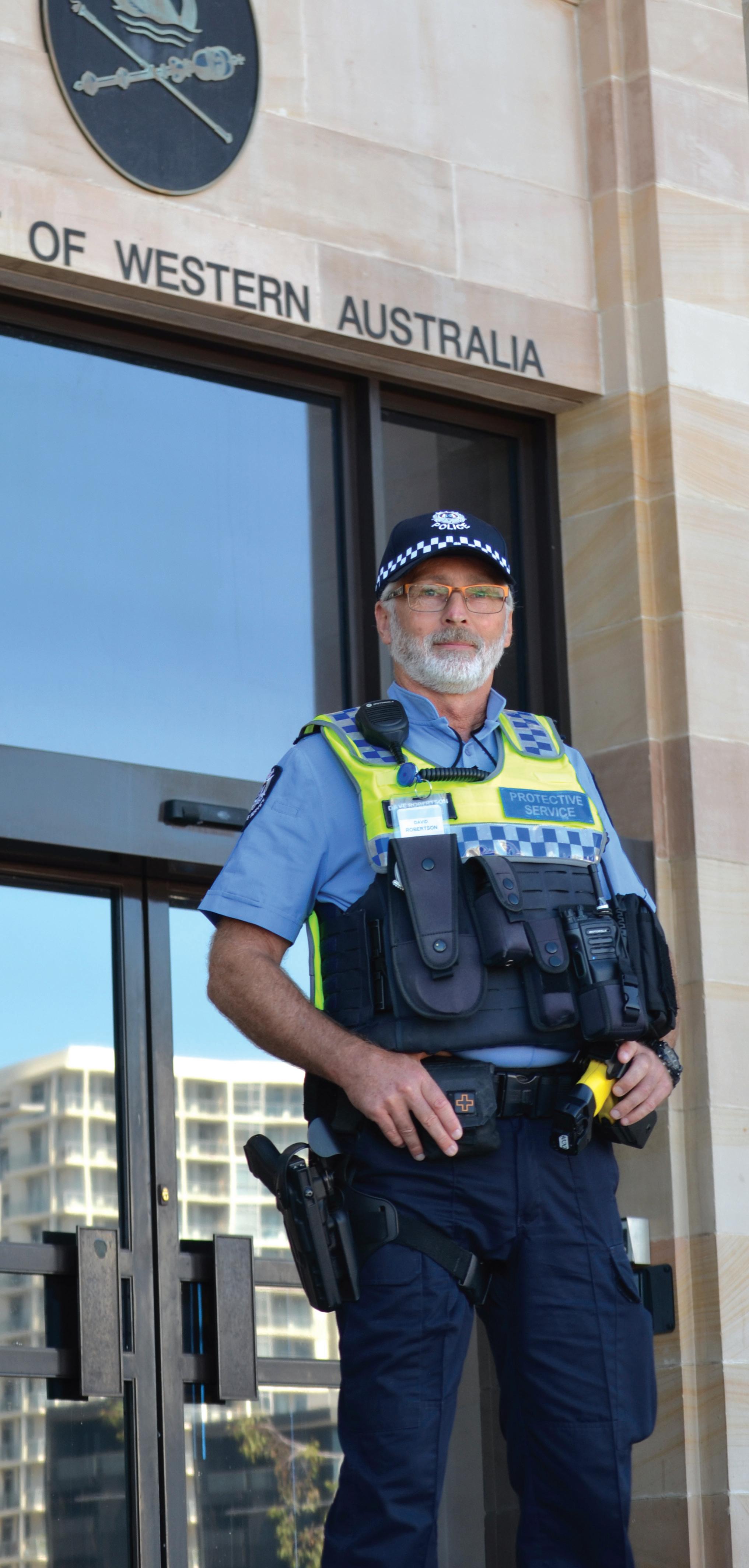
3. If you could speak directly to our Premier, Mark McGowan what would you like him to understand about the role that you do?
The Premier regularly sees Protective Service Officers within the Parliamentary Precinct and I would like him to understand the importance of our role and the responsibility that goes with it. Even though we are not always dealing with offenders our physical presence is a deterrent that can’t be measured. ■
POLICE NEWS MARCH 2023 26
“A specialist allowance would reflect the extra responsibility of having a lethal force option and the specialised training that we do to ensure safety within the Parliamentary Precinct.”
WAPU SCHOOL HOLIDAY BALLOT APPLICATION
APPLICATIONS WILL ONLY BE ACCEPTED ON THIS FORM, It can be emailed or posted to the Union office. Complete and return by Friday 21 April 2023 to: WA Police Union

639 Murray Street, West Perth WA 6005 Email: admin@wapu.org.au
Results to be advised by Friday 28 April 2023
Name (Please Print):
PD No:
Address (Home): Post Code:
Work (Unit/Section):
Email (Home):
Phone no. (Work):
(Mobile):
Only mark the holiday periods and locations you are prepared to accept in numerical order of preference. Note: Bookings are available from Saturday (2pm) to Saturday (10am) only.
DECEMBER 2023 / JANUARY 2024
ALBANY
BUSSELTON VILLA 4
BUSSELTON VILLA 11
BUSSELTON VILLA 15
BUSSELTON VILLA 23
ESPERANCE
EXMOUTH
PORT DENISON
YALLINGUP
POLICE NEWS MARCH 2023 27
WAPU
DIRECTOR 0438 080 930
Murray Street, West Perth WA 6005 PH: (08) 9321 2155 www.wapu.org.au admin@wapu.org.au
Paul Gale EMERGENCY DIRECTOR
EMERGENCY 24/7
639
*
WEEK 1 WEEK 2 WEEK 3 WEEK 4 WEEK 5 WEEK 6 16.12.23 –23.12.23 23.12.23 –30.12.23 30.12.23 to 06.01.24 06.01.24 –13.01.24 13.01.24 –20.01.24 20.01.24 –27.01.24
KEVIN McDONALD Field Officer
Regulation 603
“To assist me in conducting this investigation, I intend to ask you a series of questions to assist me to fully examine your behaviour, conduct, honesty, integrity, performance and competency. Under Police Force Regulation 1979, Regulation 603, I can order you to answer my questions. Accordingly, I now order you to answer my questions, and the answers and information you provide will be used to determine whether you have engaged in non-criminal unprofessional conduct.”
The wording above is a substantive part of an order, routinely imposed upon members who are directed to participate in managerial interviews that relate to allegations of misconduct. Examples of complaints of misconduct can range from the use of excessive force, unlawful arrests, inappropriate language or computer access to name a few. Compulsive managerial interviews are audio recorded and conducted with police witnesses.
The full wording, blunt style and even existence of this type of adversarial interview makes several implied assumptions about the interviewee.
• That they are unwilling to participate in a two-way, honest and open discussion about their conduct in response to an allegation;
• That they will likely be evasive, misleading, or untruthful;
• That they are more likely to be guilty of the allegation than innocent; and
• That they have limited understanding of the importance of appropriate conduct or the difference between appropriate conduct and misconduct.
Members are often stood down or stood aside, ordered to surrender their phones, banned from police premises, ordered not to discuss the matter with colleagues and while the burden of proof is reversed, the agency adopts a standard-of-proof only on the balance of probabilities. In other words, you’re probably guilty.
The truth is that members understand that they must maintain a high standard of conduct and when police discipline falters, it can diminish public confidence in police. When compelled to attend a managerial interview and ordered to answer questions, members frequently feel patronised, belittled, undervalued, disenfranchised, and that their reputation is tainted and career forever damaged.

It would be fair to say that the way police officers are managerially interrogated (and be in no doubt, these are interrogations), is mirrored by the way in which criminal offenders are interviewed, with the notable exception of the right to silence. Otherwise, they are more or less identical in terms of formality, interview planning, recording, conducted by an investigating and corroborating officer, and questions are firm and often unfriendly. Other similarities include conducting interviews in small, bland interview rooms ordinarily designed and used for suspect interviews. The oppressive, intimidatory settings are palpable.
A substantial and less obvious difference is that members are presumed guilty until they prove their own innocence. Members are often stood down or stood aside, ordered to surrender their phones, banned from police premises, ordered not to discuss the matter with colleagues and while the burden of proof is reversed, the agency adopts a standard-of-proof only on the balance of probabilities. In other words, you’re probably guilty.
With the advent of mobile phone cameras, proliferation of CCTV and the now full-time accompaniment of body worn camera, scrutiny of police officer behaviour is more intensive, intrusive and rigorous than ever before. And the likelihood of being exposed to the tyrannical, harsh, and dispiriting managerial interview is ever-present and more probable.
In addition to the stressful, disheartening and demoralising nature of these compulsive interviews, occasionally described as beating a peanut into submission with a sledgehammer, is the subsequent sharing of the interview content with third parties.
POLICE NEWS MARCH 2023 28
In addition to the stressful, disheartening and demoralising nature of these compulsive interviews, occasionally described as beating a peanut into submission with a sledgehammer, is the subsequent sharing of the interview content with third parties.
Even though members respond to the order to answer questions with a union caveat which states in part:
“I do not consider I have any other option but to answer the questions put to me. I do not give permission for any record of this interview to be disclosed to any third party outside the WA Police Force”,
The word fight is lost when afterward, the managerial interview introduction concludes with:
“The Western Australia Police is an agency which is bound by various statutes which may require the release or disclosure of your answers and as such, any request received by the Agency will be dealt with on its merits in accordance with the relevant legislation.”
This plays out badly for our members in several ways. Through Freedom of Information (FOI), defence counsel seeking to attack the credibility of police witnesses are able to acquire managerial interview transcripts, complaint histories of police officers and use it for completely unrelated matters. A recent exchange in court between a serving police officer and defence counsel went something like this:
Counsel “So Constable, is it true that you have had a number of complaints levelled at you regarding excessive use of force?”
Officer “Yes but they weren’t…..”
Counsel “Just answer the question Constable, is it not true that you have been internally investigated on multiple occasions for using excessive force”
Officer “Yes”
Counsel And you were interviewed by Internal Affairs?
Officer “Yes”
Counsel “And those complaints pertain to incidents involving arrests where you used force?”
Officer “Yes”
Counsel “And the force you used in those incidents was just like the force you used against my client, the accused, when you arrested him?”
You get the picture.
Other examples of ‘information sharing’ of managerial interview transcripts include people using FOI to obtain information in support of restraint orders and civil action against police officers including lawsuits and family court matters.
The defensive argument for retaining this outdated disciplinary relic is “if you’ve done nothing wrong, then you’ve got nothing to worry about ”. This rationale doesn’t stand up because it’s the actual interrogation process that does the harm, especially when matters are not sustained or unfounded.
While we are yet to see any acknowledgment at all on the part the Police Minister or the police executive that a morale problem even exists in WA Police, the routine use of Regulation 603, along with the manner in which it is used, is but one of the morale sapping tributaries going toward the ongoing attrition explosion.
Regulation 603 came into being almost a half century ago and despite the subsequent establishment of external oversight bodies who investigate serious misconduct, such as the Ombudsman and Corruption and Crime Commission (which has compulsive powers), the practice by WA Police of forcing people to sit meekly, be interrogated and answer questions about minor misconduct continues, and to the detriment of members forced to endure it.
The defensive argument for retaining this outdated disciplinary relic is “if you’ve done nothing wrong, then you’ve got nothing to worry about”. This rationale doesn’t stand up because it’s the actual interrogation process that does the harm, especially when matters are not sustained or unfounded. The obvious answer is to get rid of it.
Regulation 603 causes more harm than good and ideally should be repealed. This might encourage WA Police to replace it with a process that treats its employees with some of the core values it advocates such as respect, empathy, care and trust, and one that is delivered within a contemporary, civil and balanced employee relations framework.
POLICE NEWS MARCH 2023 29
FIELD REPORT
Meet your police officer of the year
Exemplary service, strong leadership and dedication to the community has earnt Senior Sergeant Trisha Stjepic the title of police officer of the year at the 2022 Nine News Police Excellence Awards.

Trisha received multiple nominations for her outstanding commitment to leadership, operational integrity, and building rapport with the community.
Beginning her policing journey as wide-eyed police cadet in 2007, Trisha later became a police recruit in 2008. After graduation, she spent two months at Perth Police Station before going regional to South Hedland Police Station.
Following her regional service, Trisha returned to the city and took up roles at the Online Child Exploitation Team, Child Abuse Squad and Armadale Police Station, before undertaking her Detective Training in 2013.
She also worked at Cannington District Crime Team, Sex Offender Management Squad and Kensington Police Station before transferring to South West Detectives and back to the Regional Investigations Unit, before being promoted to shift supervisor at Belmont Police Station.
POLICE NEWS MARCH 2023 30
01
The senior sergeant said she was surprised by the win, but very proud of her accomplishment.
“It was a very proud moment and one that I couldn’t have achieved without the support of my family, colleagues and in particular, my husband,” she said.
“I was shocked with the nomination. You come to work every day and just do your best: you don’t ever think to do it for recognition so it was a nice surprise.”
Trisha is a shift supervisor at Belmont of a team of ten.
“It’s a busy location with very junior staff so it’s a great role for me to be able to mentor and lead those junior officers and help shape their careers,” she said.
“I have a detective background so I try to share my knowledge and experience with them the best I can.”
Trisha’s message to anyone wanting to join the force, was to go for it.
“Every day is different so you never know what your shift is going to bring. There are so many areas of policing too, so if you do not enjoy one area you can always move on and try something new,” she said.
“WA Police is so broad I am sure there will be an area you will love and make the most of every opportunity you are given. Every role, every job, every investigation comes with some kind of learning.”
WA’s 2022 top cop said that one of her more memorable jobs came recently when she was involved in helping a domestic violence victim who had no trust in government agencies after losing her children to CPFS.
“I worked with her, built trust and rapport and had her disclose some serious domestic violence from her ex-partner and refer a prosecution against them,” she said.
“Recently I have also been involved in investigating a covert drug investigation at a station level and exposing uniform police officers to this type of investigation.”
“These jobs give me great satisfaction as it is not something they are exposed to very often, so it’s great providing them that experience.”
Trisha is also known in her instrumental role in the establishment of the Quokkas , a WA female police officer football team.
“Having this team is a good outlet away from work, with likeminded people,” she said.
“To get the Quokkas up and running took a lot of effort but I’m very happy I was able to achieve this with the help of Inspector
SILWOOD. It’s great being able to provide a fun healthy supportive team for our local female officers, it’s something I wish they had back when I joined.”
Joining Trisha in her win at the Excellence Awards was the winner of the team category, Regional Investigations Unit, Criminal Gangs & Regional Investigations.
The Regional Investigations Unit officers have been recognised for their dedication to frontline policing in the identification, location and apprehension of some of the state’s most high-harm and active offenders.

They ensure community safety, whilst obtaining evidence and demonstrating empathy, understanding and care to victims.
If you know a deserving police officer doing outstanding work, nominations for the Nine News Police Excellence Awards open mid-year. ■
POLICE NEWS MARCH 2023 31
“I was shocked with the nomination. You come to work every day and just do your best: you don’t ever think to do it for recognition so it was a nice surprise.”
02
01 Senior Sergeant Trisha Stjepic. 02 Regional Investigations Unit, Criminal Gangs & Regional Investigations.
Free legal services for WAPU Members, their families and retired Members.
Leading Australian law firm, Tindall Gask Bentley is the preferred legal services provider of the WA Police Union, offering 30 minutes of free initial advice and a 10% fee discount.


To arrange a preliminary in-person or phone appointment contact WAPU HQ on (08) 9321 2155
CRIMINAL AND DISCIPLINARY
• The Corruption and Crime Commission
FAMILY AND DIVORCE
• Courts of Inquiry
• Criminal and Disciplinary matters
Matrimonial, De Facto and Same-Sex Relationships
• Children’s issues
• Child Support matters
PERSONAL INJURY
• Motor accident injury compensation
• Workers compensation
WILLS AND ESTATES
• Wills and Testamentary Trusts



• Enduring Powers of Attorney
• Enduring Guardians
• Property settlements
• “Pre-nuptial” style agreements
• Public liability
• Superannuation claims (TPD)
• Advice to executors of deceased estates
• Obtaining Grants of Probate
• Estate disputes
Tindall Gask Bentley is a leading Australian law firm.









We’ve been helping people with injury, family and estate matters for more than 50 years.
With a culture of service and empathy, we are fiercely committed to our clients.
Renee Sapelli
Ariane Owen
Kate Major
Renee Sapelli Kate Major
Tim White
Joanne Graham
Luke Officer
JOANNE GRAHAM Associate Tindall Gask Bentley


Called to give evidence in a criminal trial?

Our top 6 tips during cross examination.
IN YOUR ROLE AS A POLICE officer, you may be called as a witness for the prosecution to give evidence in a criminal trial.
The examination of a witness falls into three stages:
1. First, you will be called to give evidence in chief.
2. Secondly, the defence may wish to cross examine you.
3. Finally, the prosecution may reexamine you in order to provide qualification or further explain an answer arising from your cross examination.
CROSS EXAMINATION
In this article we will focus on cross examination. Cross examination is rarely an enjoyable experience, even for experienced police officers. The purpose of cross examination is to provide both the prosecution and defence with a means of probing and testing the evidence of a witness. Often, the aim of cross examination is to expose any flaws, weaknesses or inconsistencies in the evidence, so as to damage the credibility of the witness. However, where part of the evidence being given is helpful to the defence, the cross examination may seek to highlight that evidence, and bolster the credibility of the witness to assist the defence.
TOP TIPS WHEN FACING CROSS EXAMINATION
Here are our top six tips to help you be prepared, and to make cross examination as painless as possible, starting from the commencement of your investigation.
1. REFRESH YOUR MEMORY
There is often a lengthy delay from when a police investigation begins to when a matter goes to trial. It is natural for witnesses to have forgotten some of the details of what they witnessed, or the specifics of the duties they undertook during an investigation. Accordingly, the Court will allow the use of aids to refresh your memory, and you will be entitled to review your statement and any notes taken during the course of the investigation prior to you giving
evidence. This is why it is important to take contemporaneous and legible notes during the initial investigation, as it will assist you to provide clear and accurate evidence at trial.
to ‘explain’ your answers, the more opportunity you are providing the Defence counsel to test and undermine your evidence.
2.
BRING ALL RELEVANT MATERIALS
You should not rely on, and wait for, the prosecution to provide you with a copy of your notes and statement on the day of you giving evidence. Allow yourself time to prepare by requesting a copy of all relevant materials from the prosecution, and refresh your memory well in advance of your day in Court.
3.
LISTEN TO THE QUESTIONS CAREFULLY
Being in the witness box under cross examination can be stressful, and it is important to listen fully to the whole question being put to you before you formulate your answer. Importantly, if the question is not put to you clearly, or you do not understand the question, ask for the question to be repeated or clarified. Rushing to answer a question, or trying to answer a question you did not completely understand, may mean that you give the Defence counsel additional information that they were not even seeking when they asked the question.
5. DO NOT TRY TO GUESS WHAT IS GOING TO BE ASKED NEXT Concentrate on answering only the question being put to you at the time. It is not uncommon to try to predict what the next question may be, or where the line of questioning of the Defence is going. Focusing on the next question will only be a disservice to your evidence, and you risk providing unclear evidence and, again, unintentionally give Defence counsel ammunition to discredit your evidence.
And finally;
6. STAY CALM AND BE CONSCIOUS OF YOUR BODY LANGUAGE AND DEMEANOR
4.
ONLY ANSWER THE QUESTION ASKED AND PROVIDE SHORT AND SUCCINCT ANSWERS
Keep your answers short and, if possible, provide yes or no answers only. Remember that the more you try
Whilst it is easier said than done, take nothing personally. Although you cannot be asked questions that are unduly annoying, offensive or intimidating, questions may be put to you under cross examination that make you angry or provoke you. Do not lose your cool! If you are able to remain calm and regulate your demeanor you will come across as a more credible witness. However, this does not mean you need to be a ‘push over’. You can be firm in your answers, but remain courteous and polite. Remember, every person in that Court room has a job to do and think of why you are there and your role: that is, to give the best and most honest evidence that you can.
POLICE NEWS MARCH 2023 33
LEGAL
Rushing to answer a question, or trying to answer a question you did not completely understand, may mean that you give the Defence counsel additional information that they were not even seeking when they asked the question.
Sponsored by POLICE HEALTH
Three pillars of professional mental health support
TRIGGER WARNING:
This story contains themes of trauma, mental health issues and suicide which may be triggering for some readers. If you or someone you know needs crisis support call Lifeline 13 11 14.
As Police officers, you know all to well that the demands and challenges of the job, while rewarding, also take a toll on your mental health.
Even the most resilient of minds will likely experience mental health challenges at some point or another, given the unique mix of stress, hypervigilance and regular exposure to traumatic situations that can come with the job.
Accepting this without judgement, recognising warning signs, and understanding when and where to seek professional support (for yourself or to aid a colleague), is key to proactively protecting yourself and loved ones.
There are a range of mental health professionals available to help, depending on your situation.
SO WHAT’S THE DIFFERENCE BETWEEN THESE THREE?
1. Counsellors
Counsellors may help individuals, couples or families cope with stressful life situations arising out of normal developmental changes. They may work in a variety of settings, such as private practices, schools and workplaces, or community agencies.
They also provide therapy and support to those who are dealing with a wide range of emotional and psychological issues.
2. Psychologists
A Psychologist can help you to improve work-related issues, such as stress and burnout, by providing you with strategies to manage stress and improve overall wellbeing.
diagnosis and treatment of mental health conditions. They can provide therapy, prescribe medication, and work with other mental health professionals to provide a comprehensive approach to treatment.
These can include exercises, medication, general medical care, including checking your physical health and the effects of medication, and psychological treatments.
Eligible Police Health members can claim* generous benefits towards consults with all these professionals, with your choice of provider, but GPs can also provide referrals through mental healthcare plans. So help is readily at hand.
* T&C’s apply. To receive Police Health benefits, counsellors must be accredited with the Australian Counselling Association (ACA) and or the Psychotherapy and Counselling Federation of Australia (PACFA). Police Health’s Psychology and Counselling benefits are available through Extras cover, while psychiatrist benefits are available through Hospital cover as an in-patient. Waiting periods and other conditions apply - please call 1800 603 603 for further details.
Three of the most helpful health professionals available are Counsellors, Psychologists and Psychiatrists. These professionals provide a safe and confidential space to talk about your experiences and develop a treatment plan.
This can be especially helpful if you are dealing with difficult or traumatic experiences, or if you are struggling to cope with ongoing stress and anxiety.
By talking through your thoughts and feelings with a trained professional, you can gain a better understanding of your own mental health and learn new coping strategies to help you manage your symptoms.
They’ll also help in addressing depression, anxiety, relationships, behavioural issues and substance abuse.
3. Psychiatrists
Alternatively, a Psychiatrist is a medical doctor who specialises in the

With the right support, understanding, and care, anyone can learn to prioritise their mental health, and in doing so, open the door to a happier and more fulfilling life.
If you or someone you know needs crisis support call Lifeline 13 11 14.
POLICE HEALTH BENEFITS AT A GLANCE
ROLLING

EXTRAS
Police Health’s Rolling Extras cover includes a combined annual maximum benefit of $850 per person for Psychology and Counselling, and a combined Rollover Maximum of $1,700. A 2 month waiting period applies.*

GOLD HOSPITAL
Police Health’s gold Hospital cover includes hospital in-patient psychiatric services for the treatment and care of patients with psychiatric, mental, addiction or behavioural disorders. For example: psychoses such as schizophrenia, mood disorders such as depression, eating disorders and addiction therapy. Psychiatric care is excluded from the usual 12 month waiting period for Hospital cover.*
FN0070
HEALTH POLICE NEWS MARCH 2023 34
Fleet Network helps WA Police members drive their way to savings

Henry Robson has been employed with WA Police for nine years as a Patrol/Inquiry Officer in the Central Regional Operations Group. The first time he heard about Fleet Network was through a friend at work. Although he was already in a novated lease agreement, the customer service from his provider at the time was not hitting the mark. Since Henry had difficulty contacting his provider directly to order his next car, he began exploring his options for his next lease.
A 4-hour response promise and exceptional customer ser vice impressed Henry immediately. Setting up a lease was straightforward and easy, with a team at his disposal ready to answer any questions.




“Having people who were responsive and available, and who I could speak with directly, made the whole process very painless”, said Henry.
Henry’s new novated lease with Fleet Network coincided with his return to Perth. Since he had been working regionally for the last several years, he was looking for a smaller, more fuel-efficient vehicle for his significant daily commute. Henry landed on a 2022 Hyundai i30 N Line – and he was delighted with his purchase!
“This model was a compromise with the wife as I wanted their N Performance model, but it was a bit pricey. The N Line is a quick little car with a heap of clever features and was a really good price.”






Henry enjoys his daily commute in the N Line after switching to Fleet Network and setting up a novated lease. He suggests that others consider Fleet Network for their next vehicle or upgrade.
g t ork an others or upgrade

POLICE NEWS MARCH 2023 35 Talk to Kane Bowra today to learn more 0401 522 626 kaneb@fleetnetwork.com.au
“
I would definitely recommend Fleet Network. They’re good, friendly people and are very helpful and patient with my endless questions!”
FN0070
Henry Robson, WA Police
NEW OFFICERS JOIN THE FRONTLINE
Congratulations to the 51 new police officers who graduated from the WA Police Academy last month.
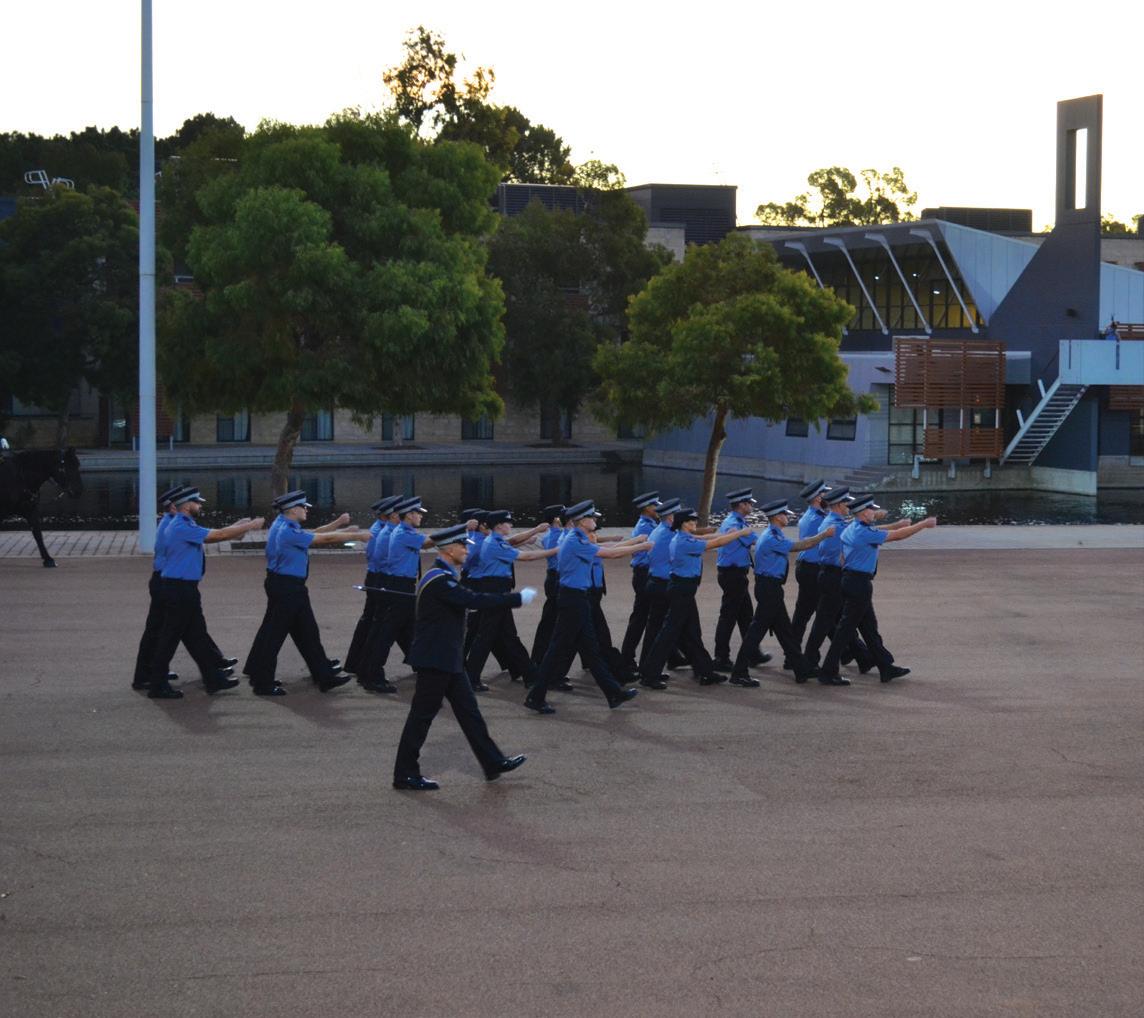

Police Commissioner Col Blanch and Police Minister Paul Papalia welcomed 36 men and 15 women from Blue and Gold Squads on February 23 in the first graduation ceremony for 2023.

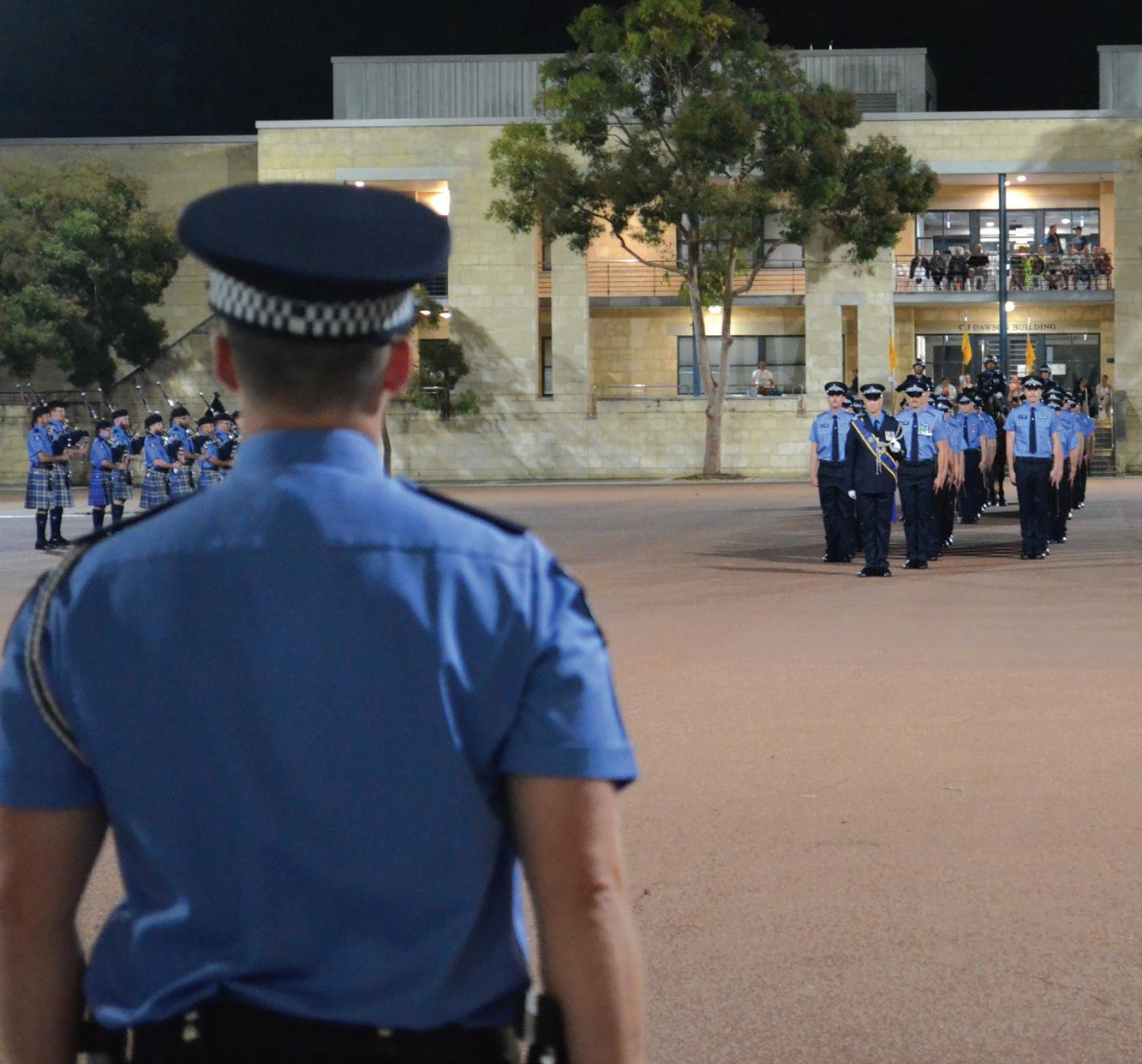
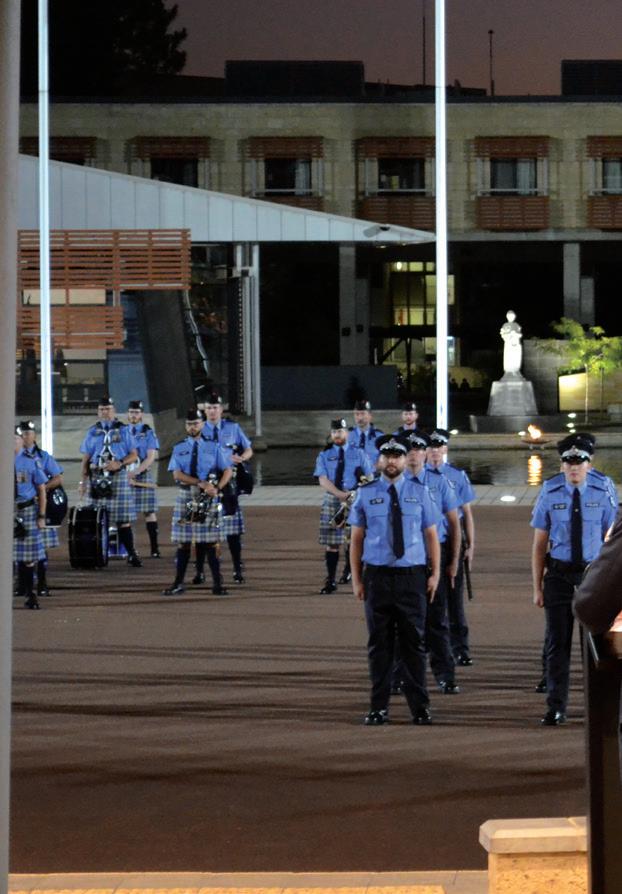

The ceremony also included a march off for retired officers Superintendent Glen Feeney, Senior Sergeant Scott Arnold and Sergeant Patrick Veaney, who served for a combined 120 years. Well done to all and welcome to the blue family.

POLICE NEWS MARCH 2023 36
NEW MEMBERS
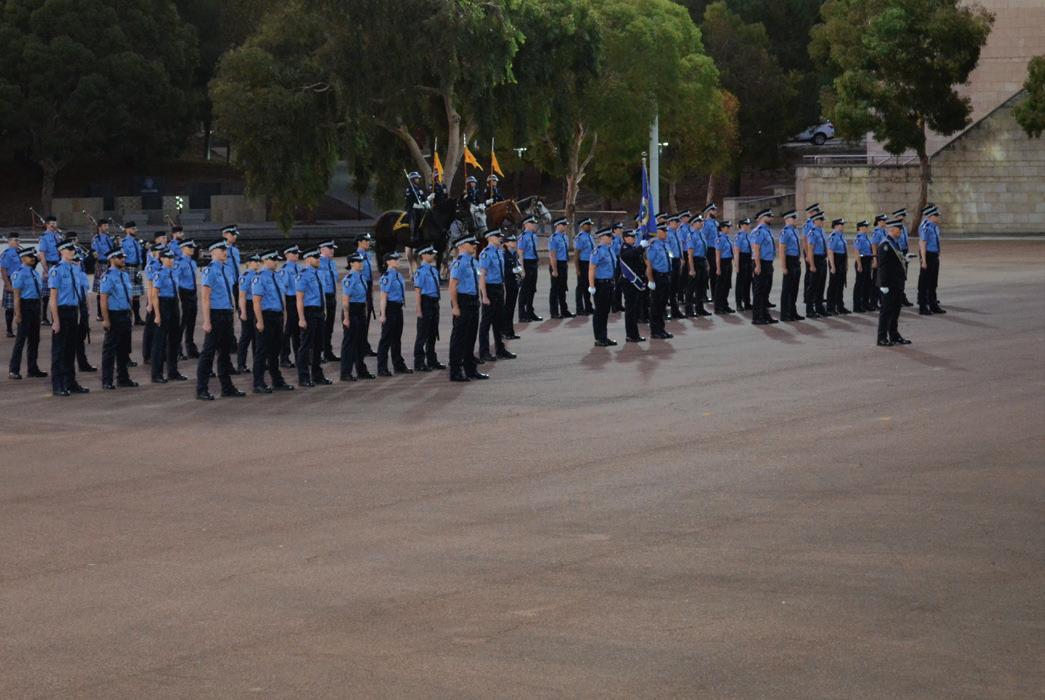




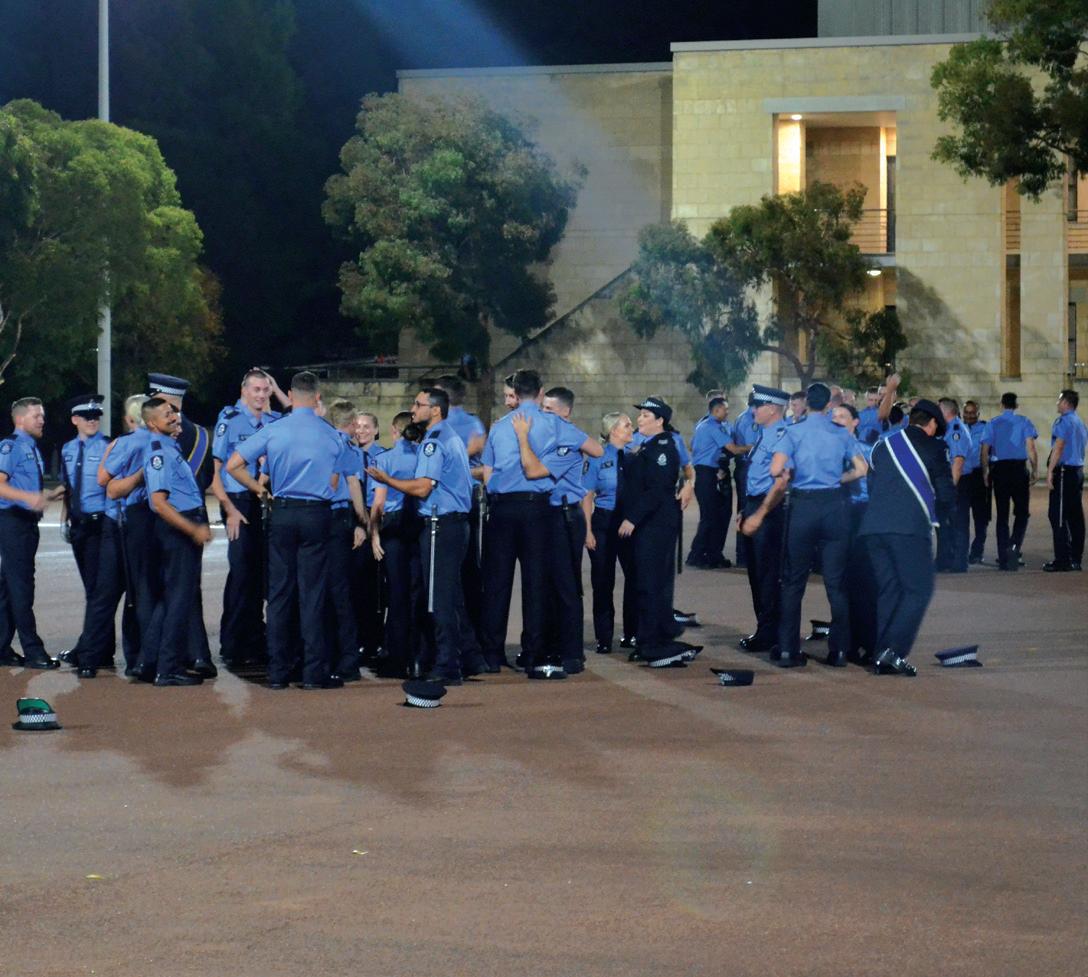


POLICE NEWS MARCH 2023 37
RETIRING MEMBERS
RESIGNING MEMBERS
POLICE NEWS MARCH 2023 38 RETIREMENTS & RESIGNATIONS 5270 Glenn FEENEY 5919 Timothy ZAPPA 5938 Martin ARCHER 5996 Patrick VEANEY 6369 James CAMPBELL 6473 Peter JANCZYK 6604 John DAVISON 7031 Scott ARNOLD 7405 Richard LONGDEN 7719 Jeffrey BUSCUMB 7744 Robert BATEMAN 8656 Russell DRAGE 9838 Paul LINES 10407 Malcolm CURREY 11087 Alan LAWRENCE 12366 Nicole EDWARDS 12896 Paul HALES 13244 Rory ANTON 13353 Julie HALL 14056 Zoe BLAKE 15198 Adam HAINES-MONAGHAN 15602 Scott MILLIGAN
7546 Douglas NELSON 8152 Ralph STEVENSON 9599 Matthew TAYLOR 10000 Joanne HAWORTH 10698 Emma BARNES 10875 Daniel WHITNEY 11103 Heather LEACH 11775 Martin NANKIVELL 11810 Roderick VINNING 11923 Jonathon ELLIS 11929 Leigh JEZEWSKI 12062 Robert HRVATIN 12200 Brenden PEAKE 12368 Serena CULLIFORD 12518 Nathan HICKS 12549 Christopher BANNISTER 12613 Benjamin BRAITHWAITE 12979 Michael SMITH 12987 Glenn WISHART 13075 Rhett ASHTON 13296 Sean BUSBY 13336 Adam KELLY 13421 Victoria HODCROFT 13496 Taryn PENNUTO 13623 Ryan DALGREEN 13723 Christopher VILES 13770 Christopher JACOB 13789 Simon GAMBLE 13902 Richard STILL 13965 Callum BOULT 14190 David NAIRN 14196 Adam McGREGOR 14309 Karl DEWAR 14733 Peter HARRISON 14792 Carrie SHARPLES 14903 Hannah DUNNET 14921 Michelle BULLEN 14975 Lachlan GRANT 15066 David COSTELLO 15070 Amber COLLIER 15096 Christopher HOBBS 15137 Mark KIMBER 15192 Gayan HETTIARACHCHI 15220 Rebecca Mc CREADY 15260 Britney GEORGE 15368 Terron KELLY 15522 David BEECHER 15658 Daniel SPENCER 15677 John OBERHOLZER 15755 Peter BURBRIDGE 15761 Cameron McDOUGALL 15827 Paul LONGDEN 16177 Laura MARSH 16233 Andrew COOK 16283 John BURNSIDE 16295 Kyle GAVIN 16371 Kerry CONN 16406 Fynn CUNNINGHAM 16419 Lauren COTTEE 16736 Michael FOOTS 16737 Sara CURTIS 16748 Stuart AINSCOUGH 16766 David MANERA 16946 Drew BUTSON 17002 Alvaro ERPEL 17136 Darrin GRIFFITHS 17143 Joshua SMITH 17219 Ashling SPAIN 17385 Domenic MAMMOLITI 17467 Jackson BRYANT 17469 Che CARSON 17740 Bronwyn LENTON 17762 Emily BREDEMEYER 17821 Kristofer STRICKLAND 17873 Dylan HAYWARD 17987 Mark FELDMAN 18159 Demetrio Van De VELDE 18166 Trajce SIZOSKI 18186 Peter CLARKSON 18198 Blake GLOSSOP
Charlottes Cottage Wellness Centre, Dongara

• Respite accommodation available by donation for ex and current emergency service personnel with PTSD (trained comfort/service dog friendly).
• 1x queen bedroom with en suite and bar fridge.
• 1x dorm share room with three single beds and en suite.
• Separate entries and parking off verandah at rear.
• Communal area on verandah with table, fridge, hot water urn and bbq.

• Close to river and ocean.
• 1x week available per client.
• All programs are run intermittently at the centre by donation.
• Friday 9.30am to 10.30am –community meditation class followed by tea, coffee and biscuits.
• Breath work to align mind, body and soul (individual or group classes as required).
• Hatha yoga – beginner classes TBA.
Bookings & enquiries: Heather welly5@westnet.com.au
18233 Jasmyn COMITO 18239 Stephen KIDD 18245 Elma ALTON-PRATT 18270 Victoria JOHNSON 18279 Fraser BARNS 18297 Laura McKEATING 18339 Nathan WRIGHT 18343 Caitlina HENSBY 51745 Jollin JOHN 53841 Bob STENSON 53851 Tayla DOBELS 54199 Lilly DARCEY 54283 Sabien MACK 54304 James DRAPER 54305 Amandeep SINGH 54679 Muhammad KHAN 99915 Sean AUSTIN POLICE NEWS MARCH 2023 VALE SERVING 17281 LUKE JOSE MARCIAL Constable Aged 23 21/2/23 8295 GARY JAMES WALKER Sergeant Aged 56 3/12/22 RETIRED 8223
DOUGLAS HUTCHINS Senior Constable Aged 55 29/1/23 5191 COLIN CHARLES ELLIS Constable Aged 85 2/1/23 RETIRED cont. 3059 LINDSAY WOODLAND Superintendent Aged 88 2/1/23 5144 IAN WALTER DAVIS Sergeant Aged 76 27/12/22 6370 GLENN MURRAY Senior Constable Aged 62 6/12/22 4697 JOHN DOUGLAS YATES Senior Sergeant Aged 71 3/12/22
WADE

Police Health Limited ABN 86 135 221 519. A registered, not-for-profit, restricted access private health insurer - first established in 1935. © Copyright. *Subject to waiting periods and other conditions. Rollover applies once you’ve completed your first 12 months membership (2 years for Major Dental). Other conditions may also apply. IPSOS Healthcare & Insurance Australia research survey conducted in 2021, and conducted every two years. SECOND CHANCE EXTRAS Unlike most other health insurers we don’t necessarily re-set your extras benefits on 1 January each year.* Most benefits for extras services, like major dental, psychology and chiro, have Annual Maximums, which are renewed each calendar year. With Police Health’s rollover benefit for many services, unused Annual Maximum benefits not claimed in one year can be rolled into the next, giving you a second chance to make the most out of your extras benefits.* Find out more, visit policehealth.com.au/SecondChanceExtras or call it in 1800 603 603. want more out of your extras? Scan to compare benefits























































































































































































